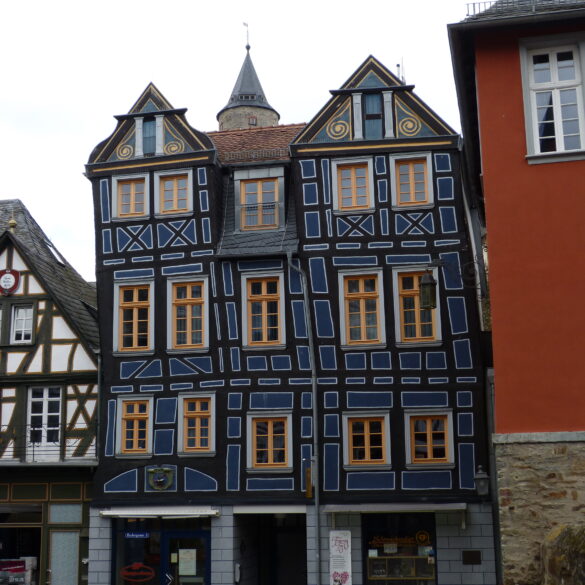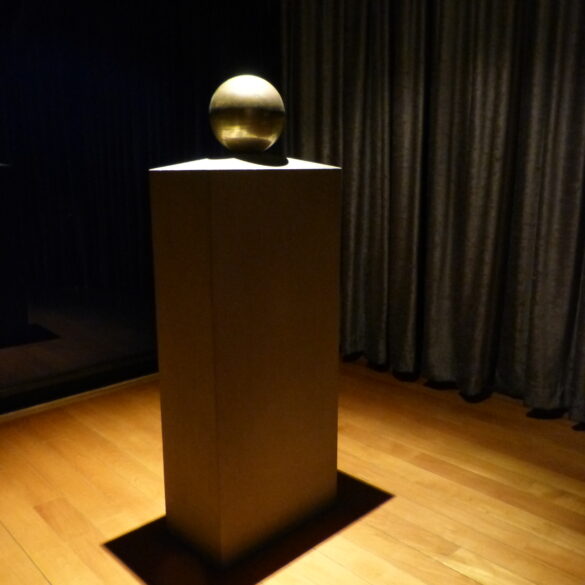Since moving to Germany in 2011, I have spent my birthday in a different European country each year.
In 2011 it was Germany, followed by Italy and San Marino in 2012 (yup, I spent my birthday in two different countries that year!), Greece in 2013 and Albania in 2014.
This year I spent it in the Czech Republic, which moves up on my list of favorite countries every time we go there.
Luckily it’s close enough for us to drive, and on day one of the trip we made the 9-hour drive to Ostrava.
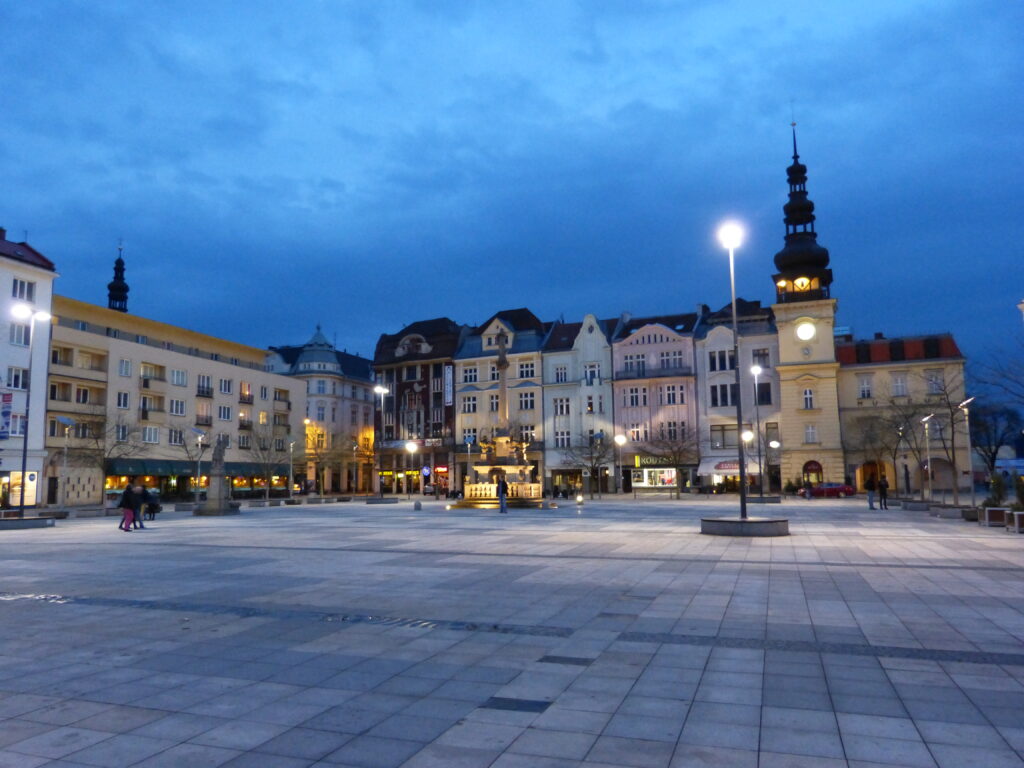
The first thing you need to know if you’re driving into the Czech Republic from another country is that you’ll probably need to buy what’s called a vignette for your car.
A vignette is a little sticker that goes on the inside of the windshield and on which you have to write the license plate number of the car.
As of this writing, the least you can pay for a vignette is 12 Euro, which will allow you to drive on highways/expressways in the country for 10 days.
When we finally arrived in Ostrava it was dinnertime, so we walked into town for a beer and a bite to eat.
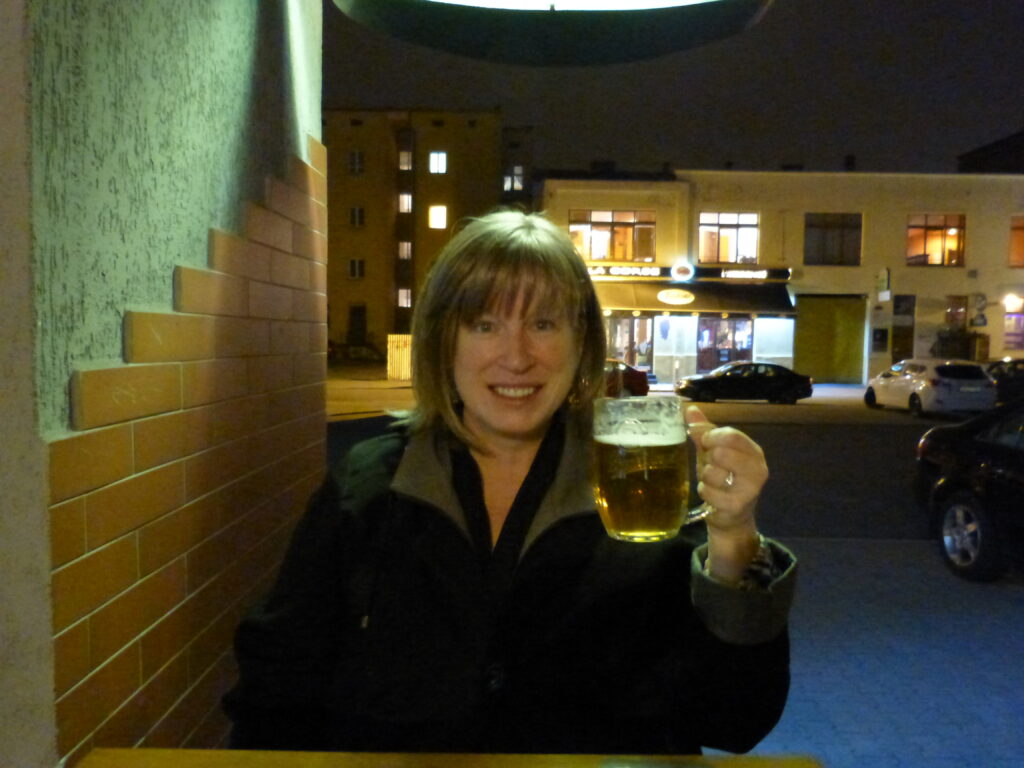
More about the beer later.
Day two of the trip was my birthday and I decided to spend it in the town of Olomouc, about an hour’s drive from Ostrava.
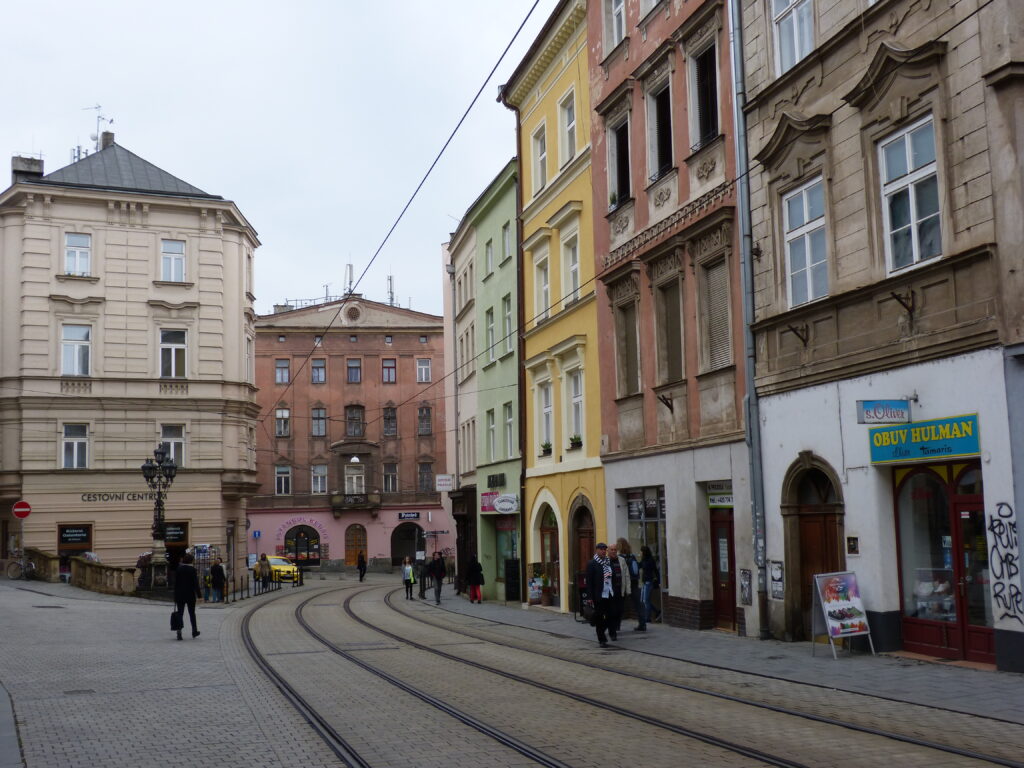
Our main reason for visiting Olomouc was that we wanted to see its UNESCO World Heritage Site.
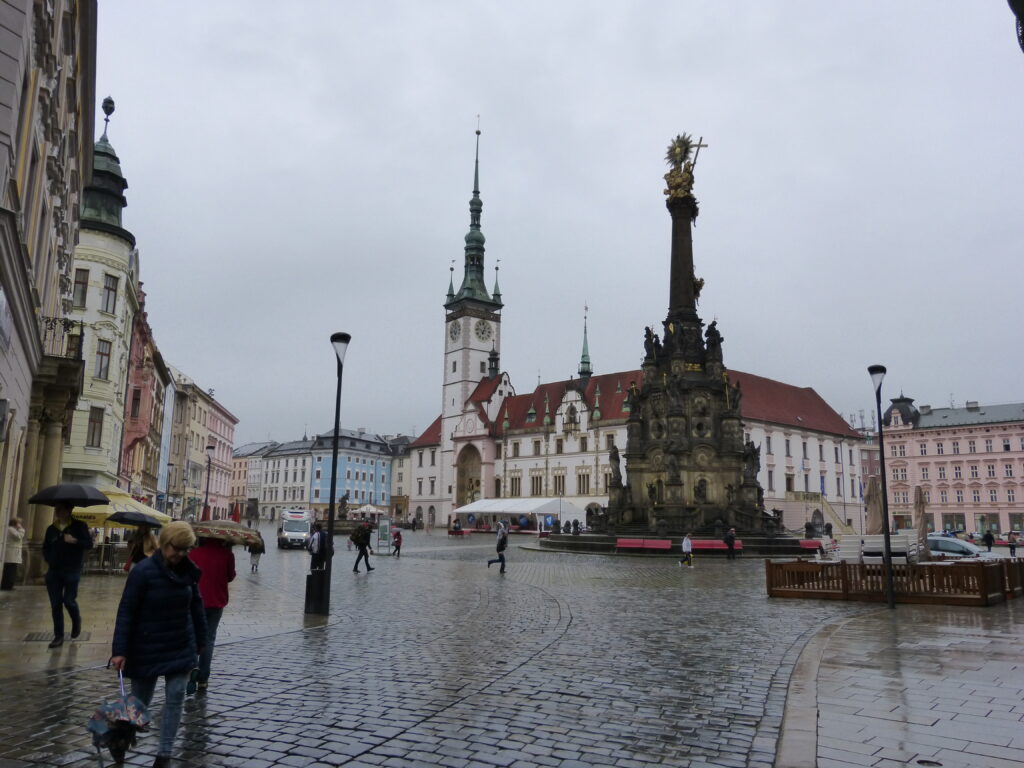
That’s the Holy Trinity Column, built in the 18th century, with the town hall behind it.
It’s 35 meters or 115 feet high; you can see how big it is when you compare it to the people in the photo.
The column is covered in statues and reliefs depicting religious figures and there is a chapel inside its base.
The column takes its name from the statue of the Holy Trinity at the top.
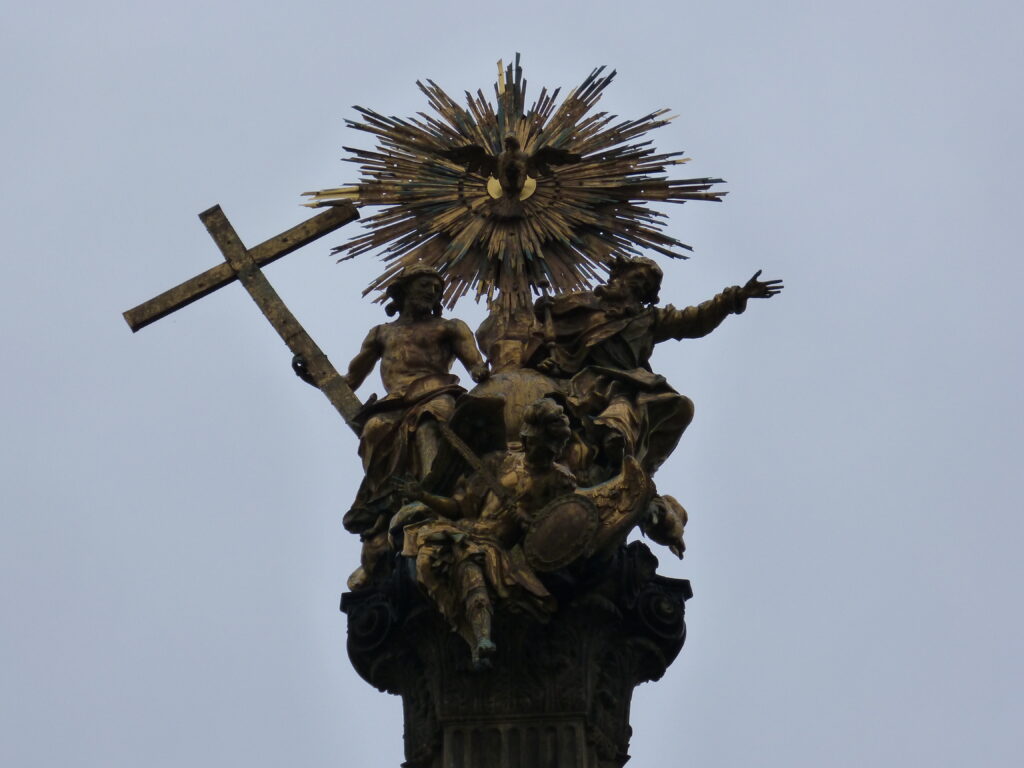
Olomouc is also known for the elaborate Baroque fountains you see in the area around the main square.
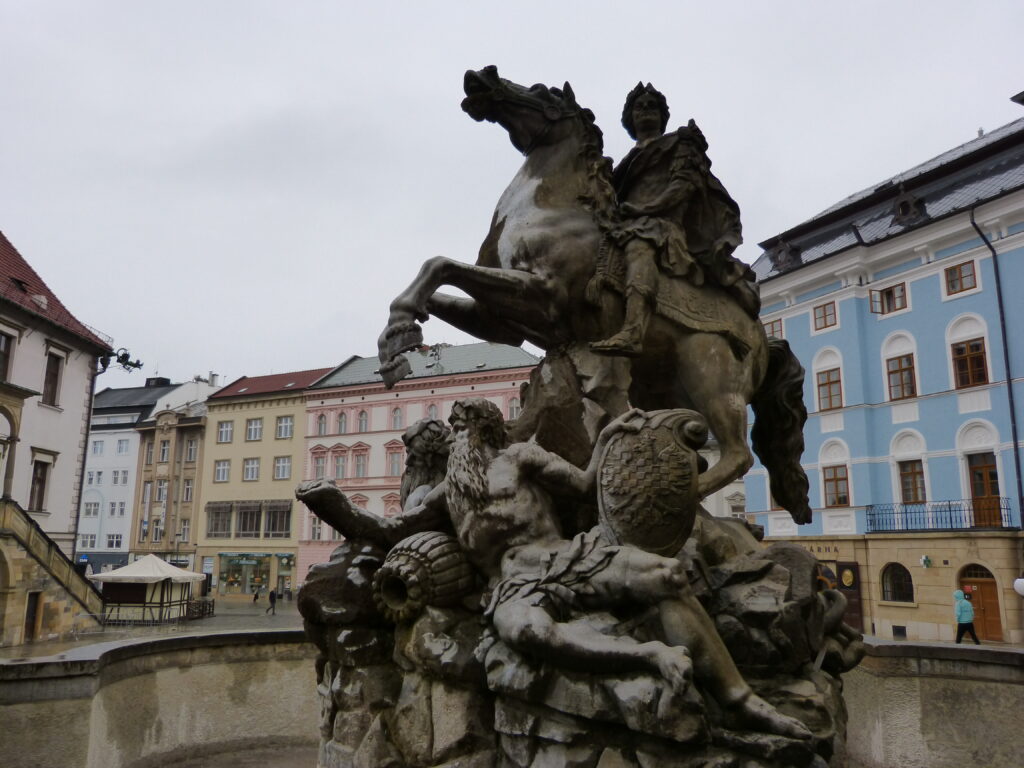
The Caesar Fountain, created in 1725, is one of them and you can see how detailed and massive it is.
A second column in the city, built around the same time as the Holy Trinity Column, is the Marian Column.
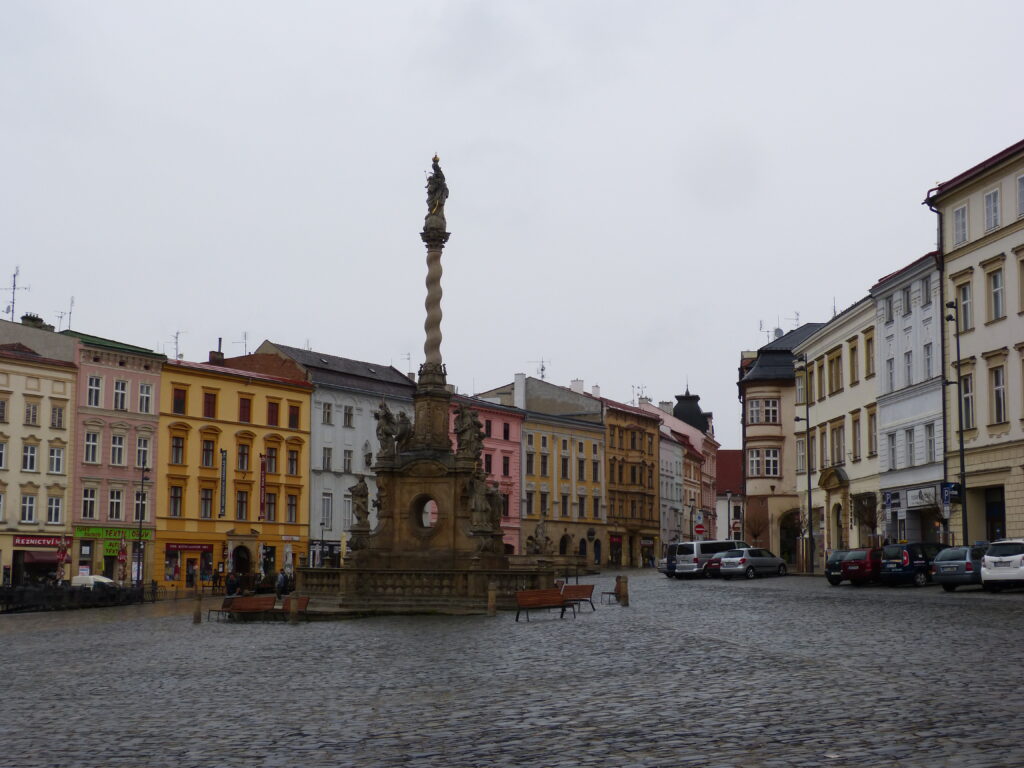
This one takes its name from the statue of the Virgin Mary at the top.
I love the colorful buildings in the square around the column.
We some clever street art while strolling around in the rain.
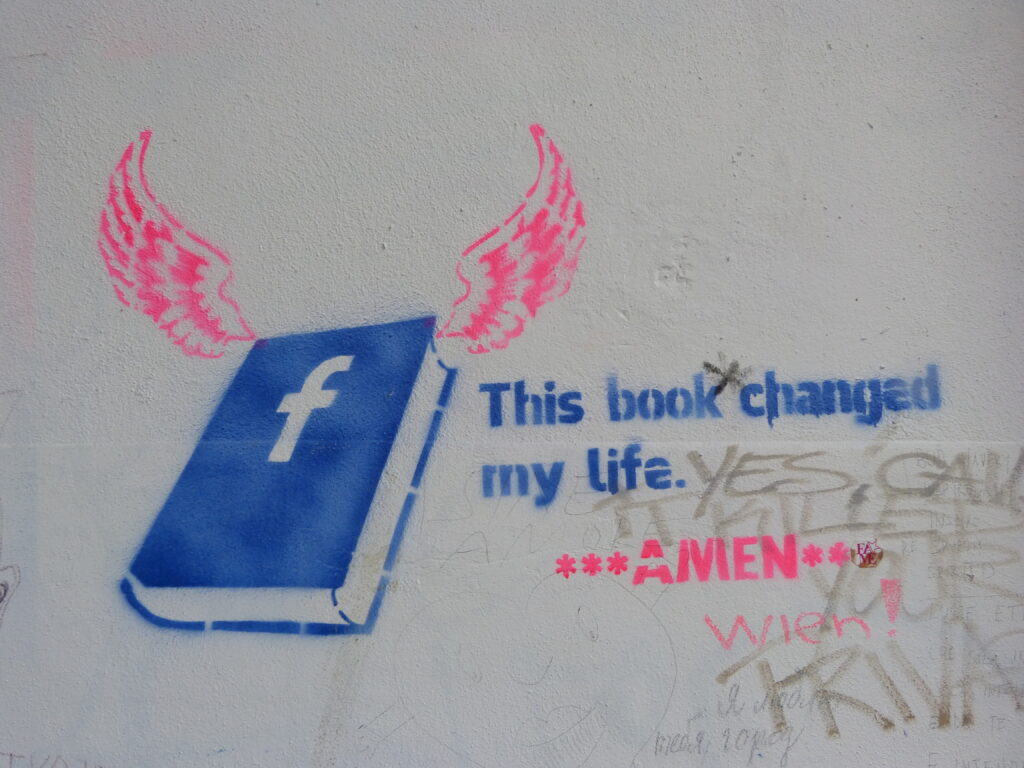
Like most European cities, Olomouc has some stunning churches.
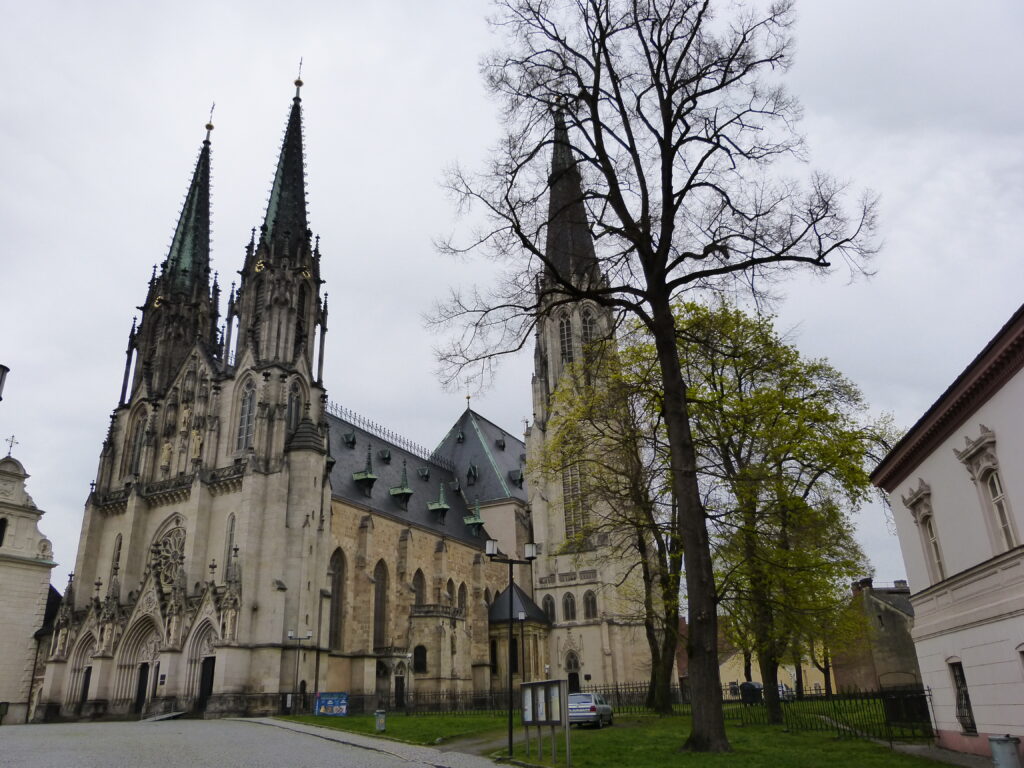
We visited four or five of them, including the St. Wenceslas’ Cathedral that you see there.
Construction was begun on the cathedral in the 12th century.
After several hours of czeching checking (sorry, can’t help myself) out the sights in the chilly rain, it was time to stop at the lovely Mahler Café for a hot coffee drink.
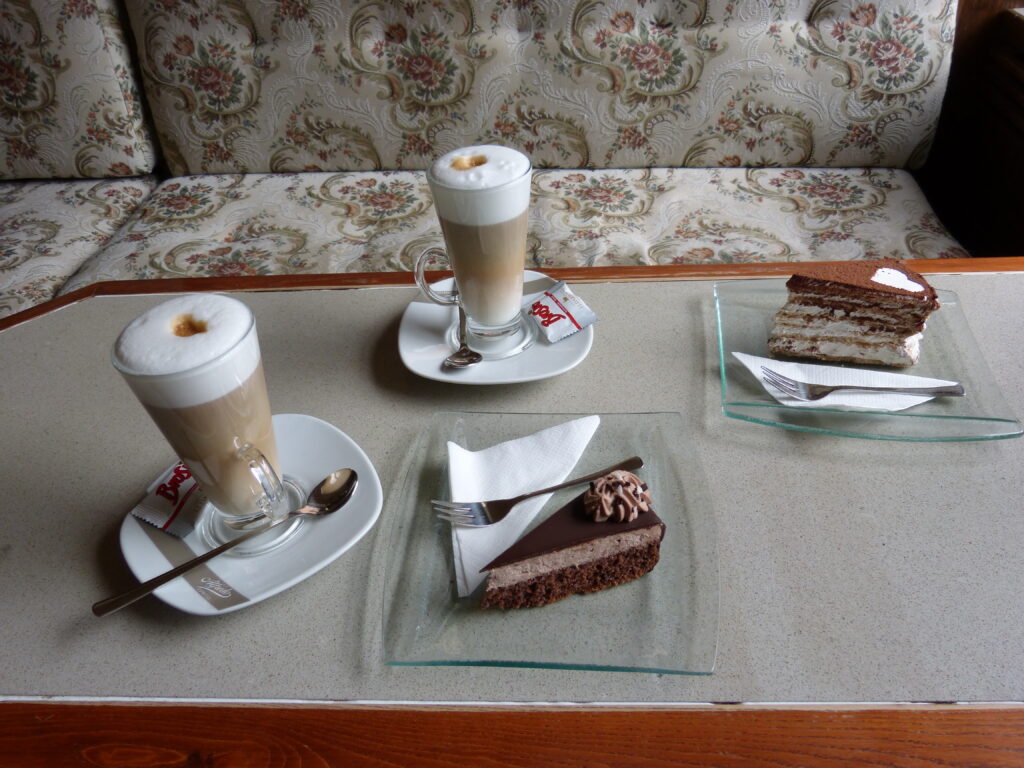
What’s that? There’s cake in the photo as well?
Of course there is – it was my birthday!
Before leaving Olomouc, we passed by the astronomical clock at the town hall.
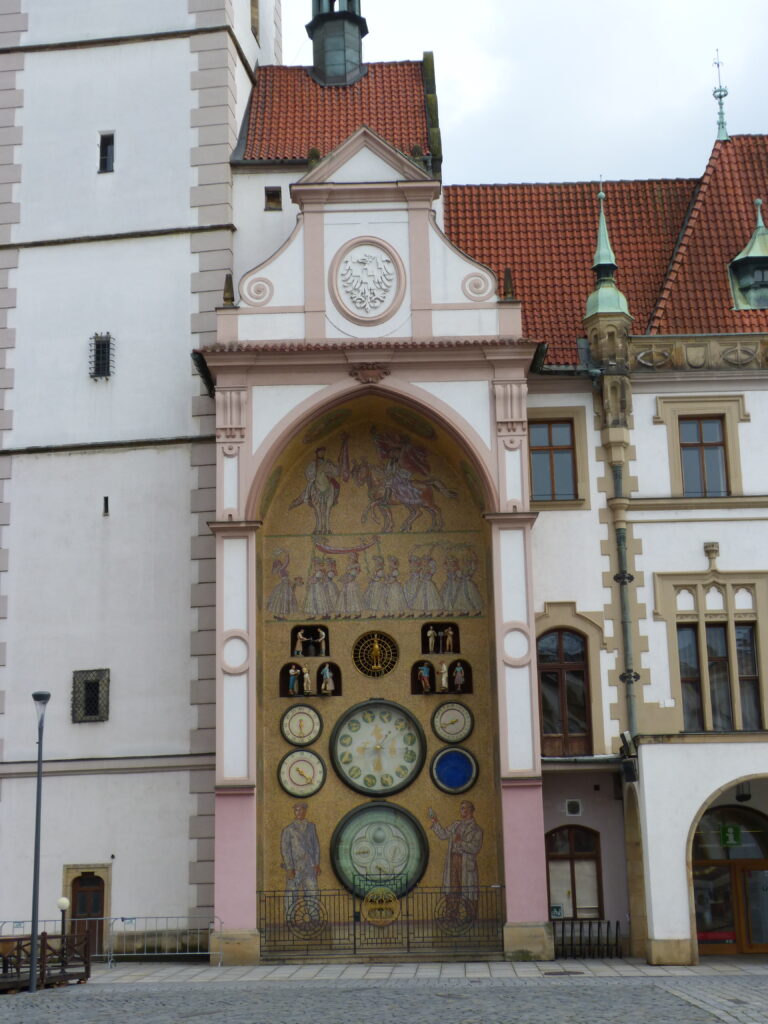
We had seen it earlier in the day but it was too rainy to get any decent photos of it.
Having seen astronomical clocks in several different cities and towns, what I liked about this one is that it’s at ground level.
You can really see the decorations and the mechanics of it up close.
We ended my birthday by heading back to Ostrava and having a couple of delicious Czech beers at the hotel bar.
The following day we drove a little over an hour in a different direction, to the town of Kroměříž.
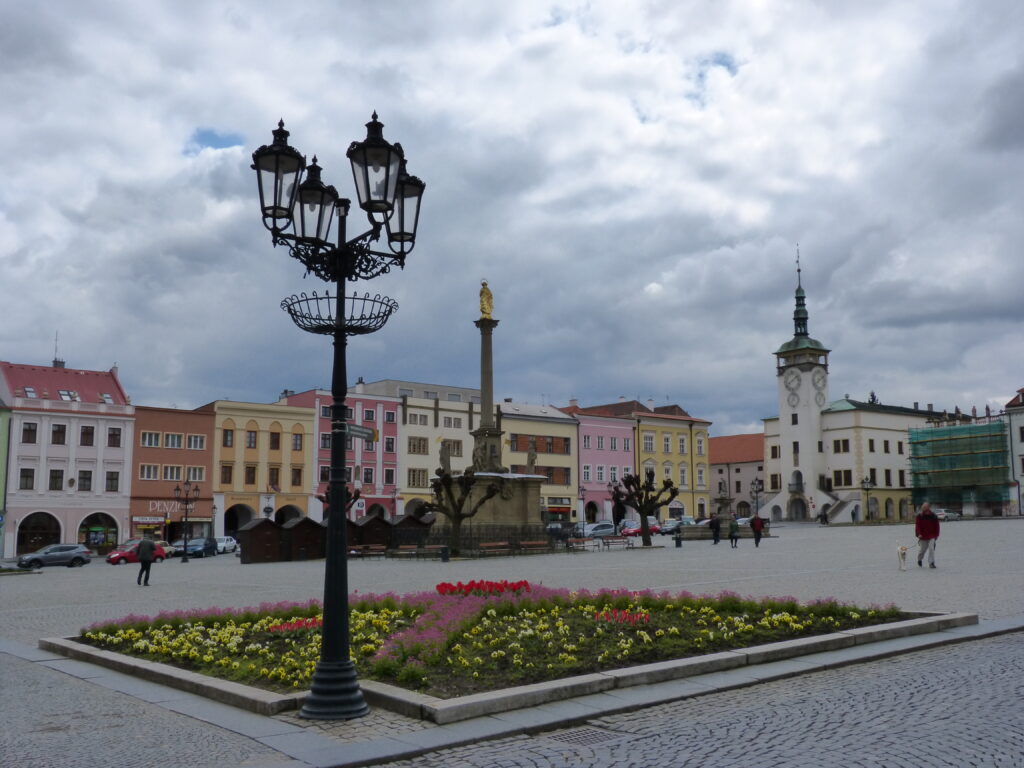
The Gardens and Castle at Kroměříž is another UNESCO site.
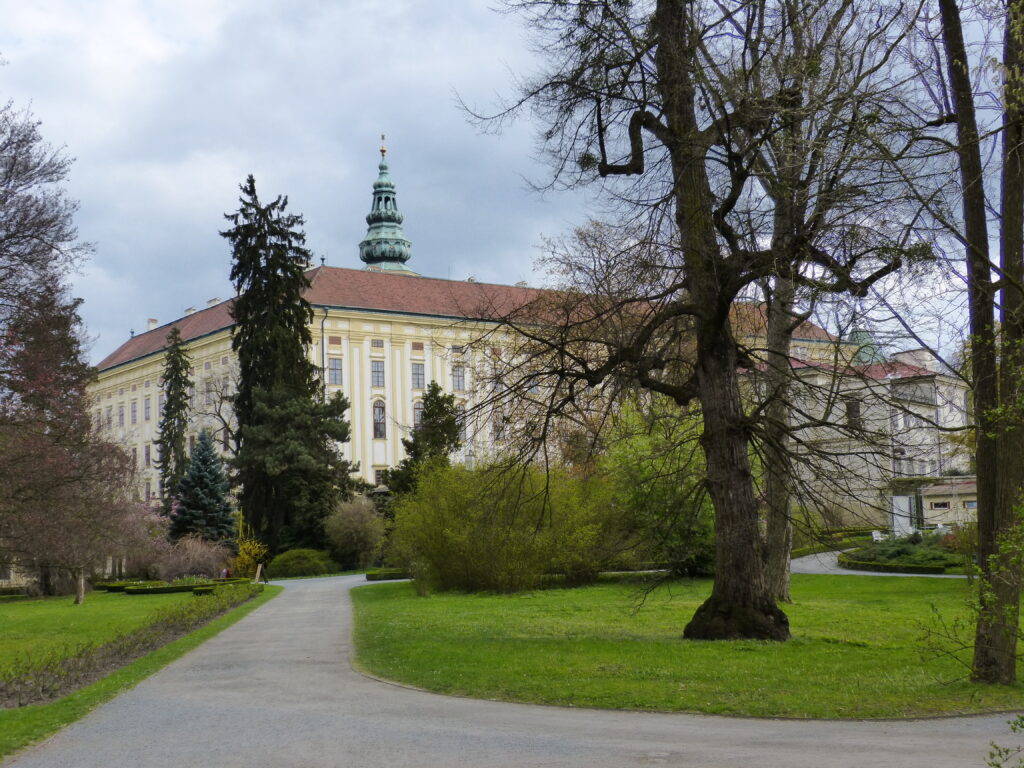
We bought a combination ticket to tour the castle and gardens and toured the castle first, which you have to do with a guide.
Unfortunately no photos were allowed inside without a permit, so I don’t have any to share with you.
I will say that “castle” is a bit of a misnomer, though, as the building was actually a bishop’s palace originally.
Before going to the gardens, we had lunch at a restaurant on the main square that you see above.
Here’s what we had: a .75-liter bottle of water, a half-liter of beer, a lovely camembert cheese appetizer, two pizzas, two cappuccinos and one dessert. With tip, the total was just over the equivalent of 23 U.S. dollars.
And remember, this was the main square, which always tends to be more expensive.
If one of the reasons you love Prague is because it’s cheap, you should definitely check out areas in the eastern part of the Czech Republic.
We were constantly amazed by how cheap it is.
Anyway, back to the gardens.
Although the flowers were just starting to bloom when we were there, it was still a beautiful place to stroll around.
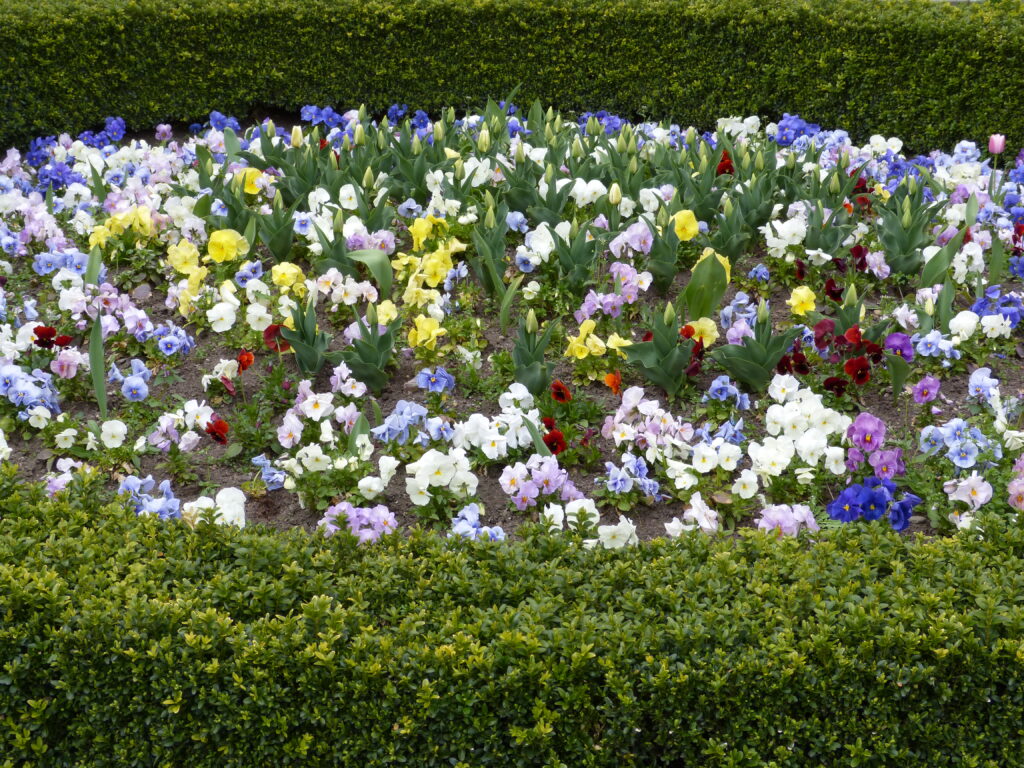
There are lots of animals in the garden as well, some in zoo-type enclosures and some roaming freely.
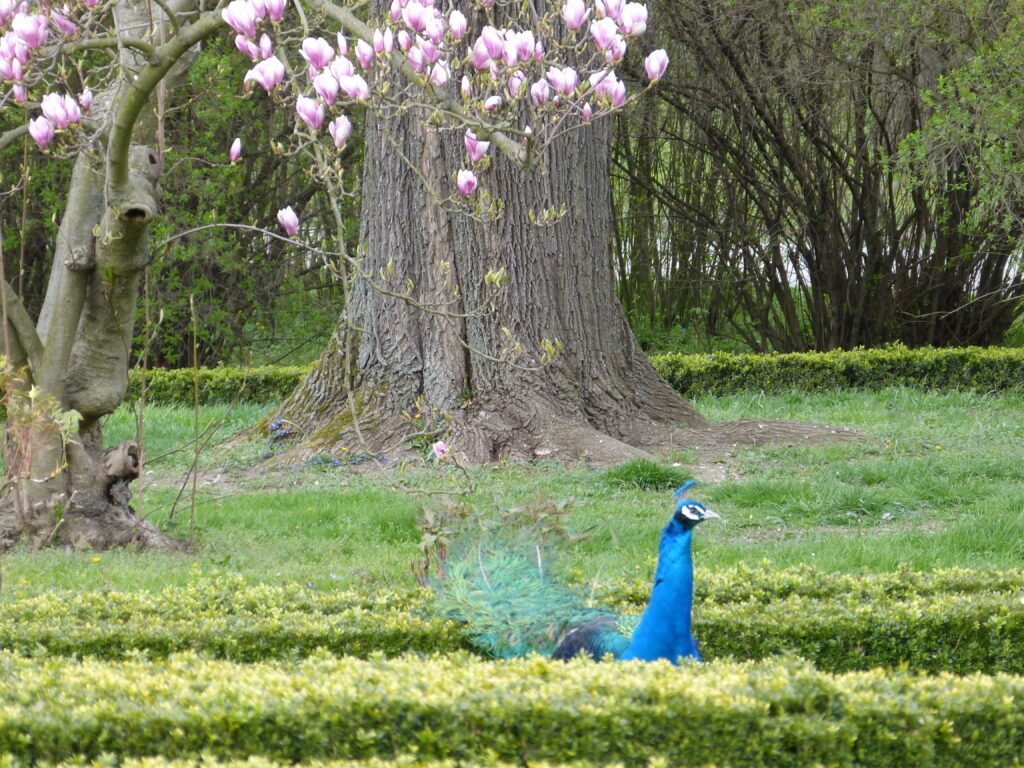
Lots of peacocks were showing off and let me tell you, if you’re near one when they spread their feathers it can be a bit scary.
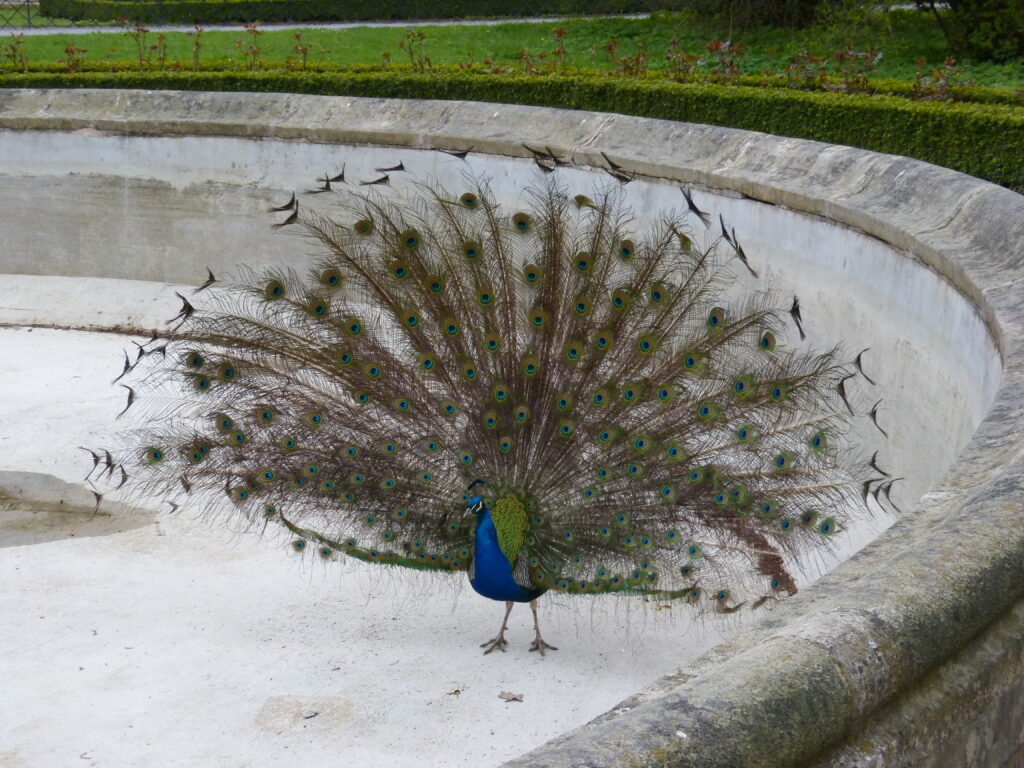
I can see why they do it because it is somewhat intimidating.
That guy just hopped into an empty fountain, lured people over to take his photo by preening about, and then BAM!
One of the things we got a kick out of was this Turkey Mafia.
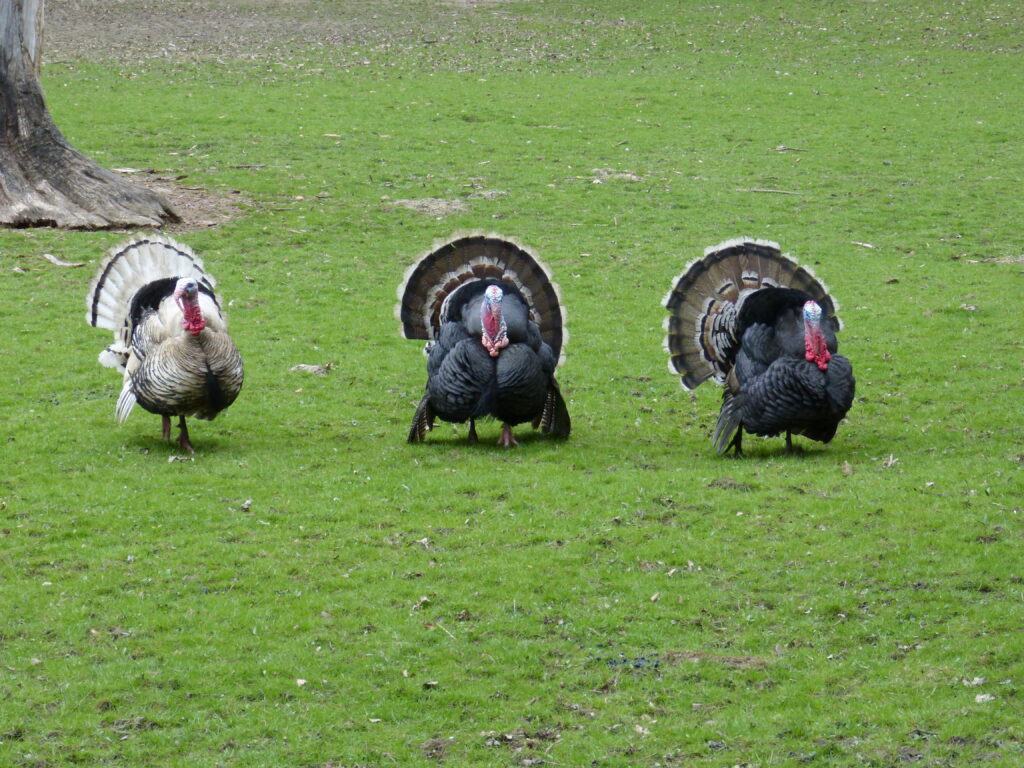
The three of them were harassing this other poor bird and kept ganging up on it and chasing it all over the place.
The three of them were moving as almost one body the whole time, and the other poor bird couldn’t get any peace.
We finally realized that they were male birds chasing around a female.
She was definitely playing hard-to get and those males had no game.
(Get it? It’s funny because turkeys are game birds? Maybe that one was only amusing in my head.)
Although we also saw monkeys, rams, ducks, chickens, cows, cats and other animals, I seemed to be most fascinated by the birds.
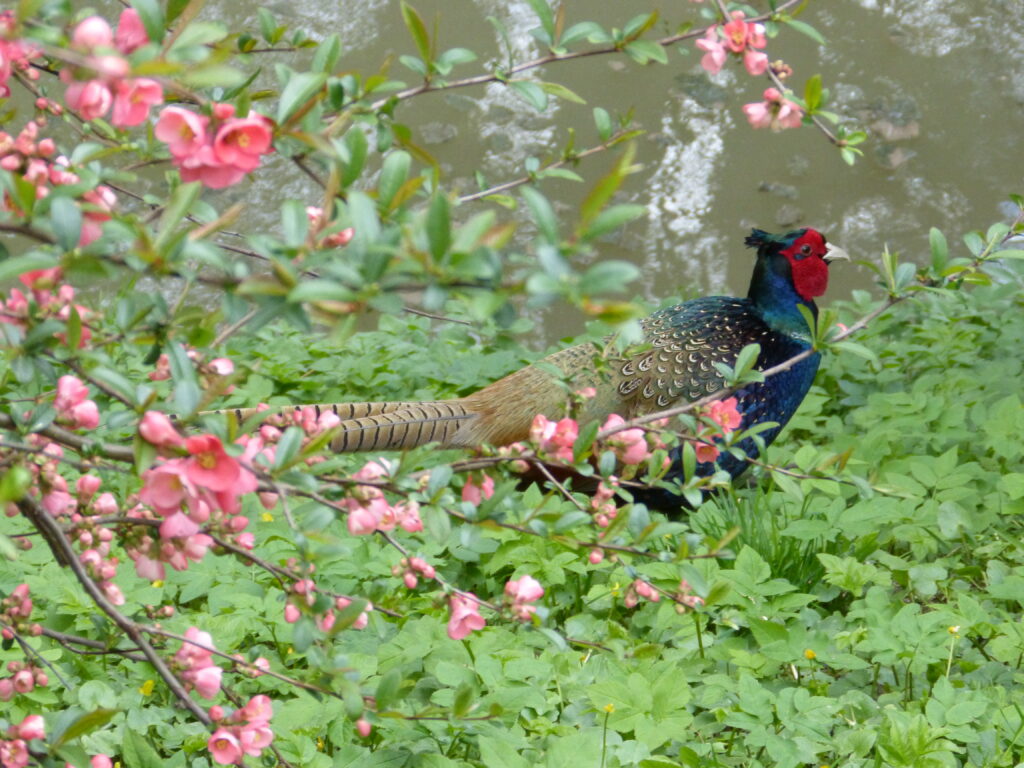
Does anyone know what that is?
I loved the colors and that it was sitting amongst those pink blossoms, making it look even prettier.
Okay, I won’t torture you with any more bird photos.
After we went back to Ostrava, we headed over to a bar on Stodolní street.
The street is several blocks long and is filled with bars and clubs.
Remember I said this area of the Czech Republic is cheap?
A half-liter of beer at this bar was just under a dollar a beer in U.S. money.
And the beer is GOOD there.
On Sunday, we switched gears a little bit and drove over to Poland to visit the Auschwitz-Birkenau Memorial and Museum.
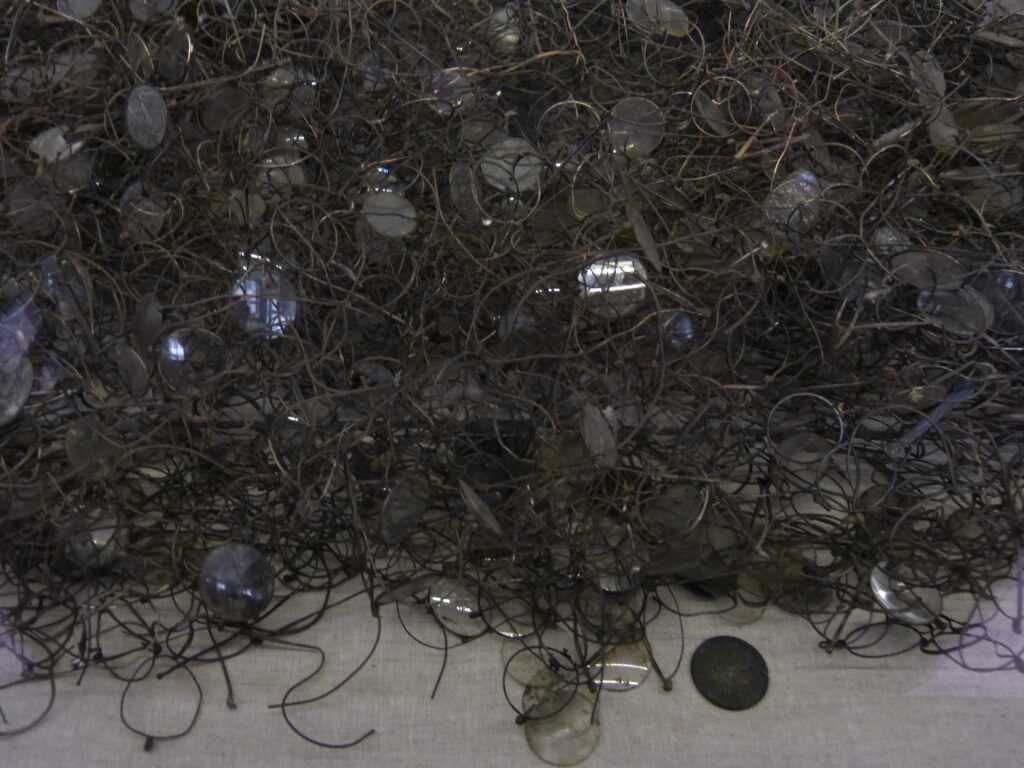
Auschwitz, as it’s commonly called, was a Nazi concentration camp.
You may think that’s an odd photo to pick for a concentration camp.
Those of you who have been there may recognize it as a pile of twisted eyeglass frames.
Walking around the former camp, you read all about the atrocities that occurred there – starvation, torture, medical experiments and murder for starters.
But for me the most heart-wrenching thing was seeing the room with displays of objects that were taken from the prisoners.
There are display cases full of suitcases, shoes, clothing, hairbrushes and those eyeglasses.
Equally as heart-breaking was seeing artwork created by prisoners.
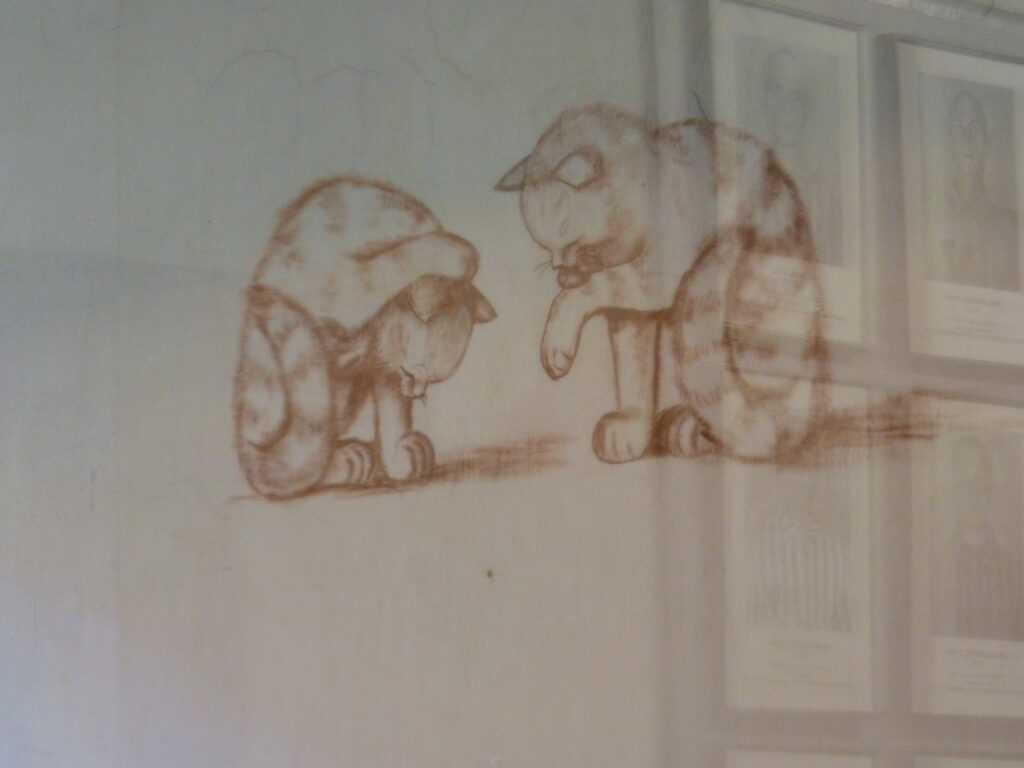
Even now it brings me to tears to look at that drawing and know that someone experiencing so much hatred and suffering could produce something so sweet and innocent.
I imagined a prisoner thinking of the beloved pets he or she had to leave behind, wondering what became of them, and capturing what they looked like during happier times.
It’s amazing what the human spirit is capable of under such unthinkable circumstances.
What is difficult to grasp about Auschwitz is the sheer size of the place and the number of prisoners murdered there.
The complex actually consisted of Auschwitz I, Auschwitz II, Auschwitz III and 45 satellite camps.
The three main camps covered an area of 25 square miles.
That’s bigger than Manhattan in New York City.
Over one million people died at Auschwitz, most of them Jews.
Think about that.
You’ve all heard it said six million Jews were murdered during World War II.
That means one sixth of them were killed at Auschwitz alone.
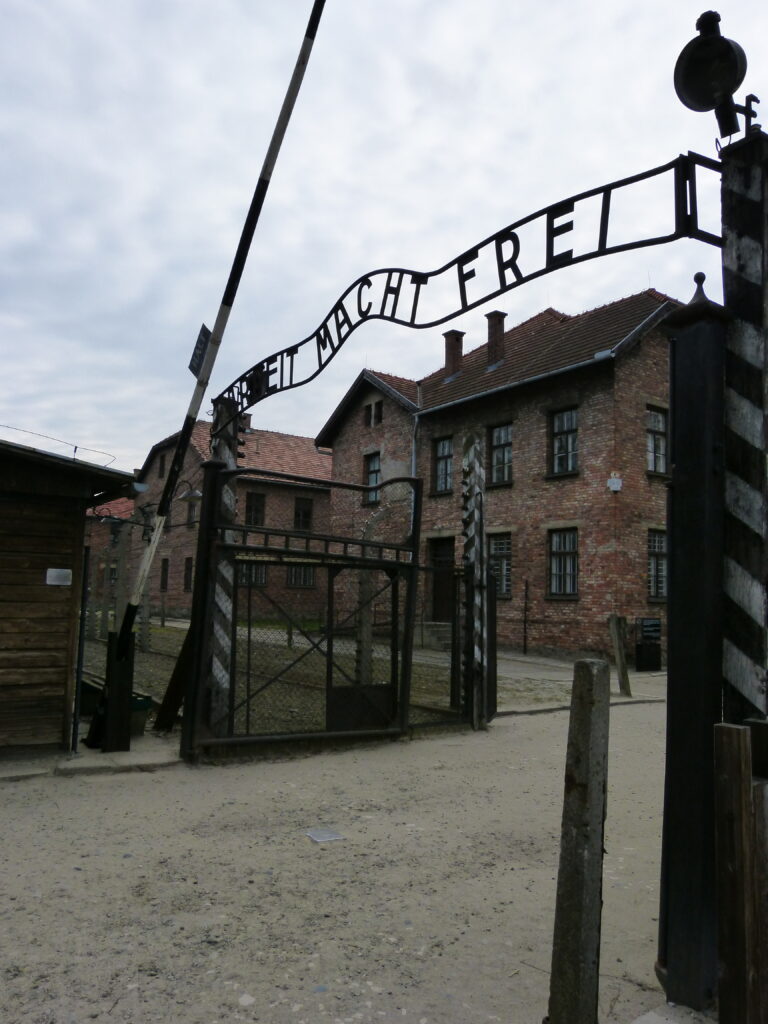
Auschwitz really deserves its own write-up so I won’t go into too much more of it here.
You’re all aware of the atrocities committed there.
I will show you one last thing, and it’s the one thing that might have any chance of giving a visitor any kind of sense of justice.
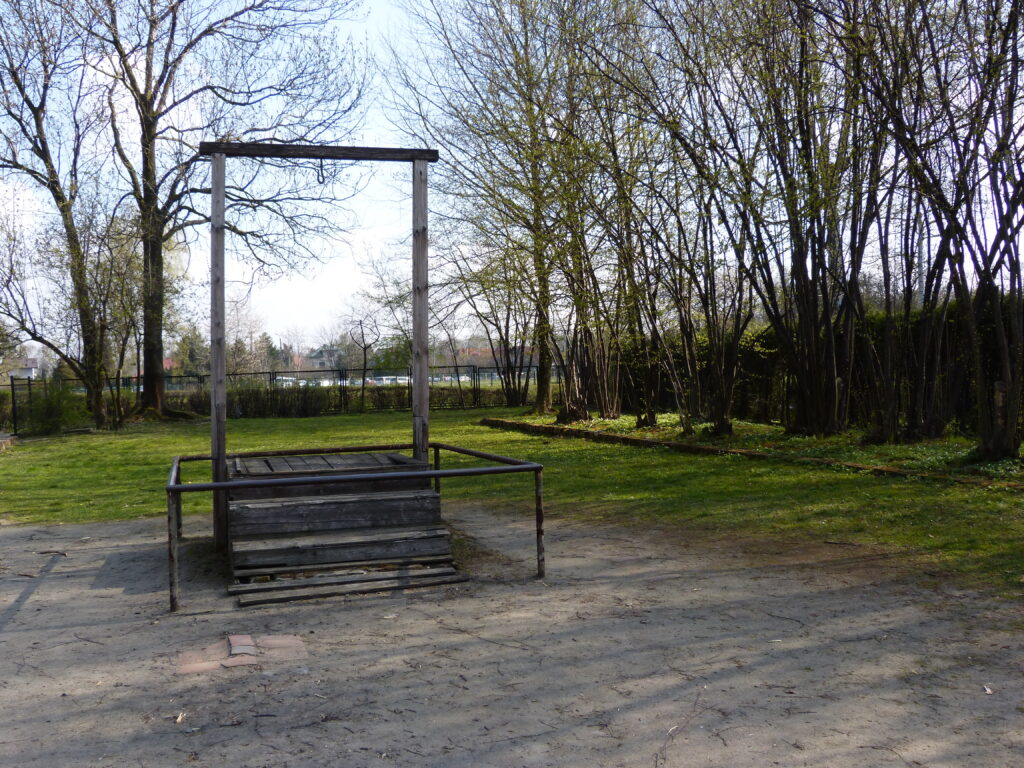
Those gallows are a reconstruction of where one man was hanged on April 16, 1947.
Obviously that was after the war ended, and the man executed there was Rudolf Höss, the first commandant of Auschwitz.
A helpful hint about visiting Auschwitz: If you are visiting on your own as we did (vs. visiting as part of a tour group), make sure you are there when it opens at 8:00 a.m. or you may have difficulty getting in.
The following day we left Ostrava to drive to Prague.
On the way there, we stopped in Sedlec, a suburb of the city of Kutná Hora, to see the famous Sedlec Ossuary.
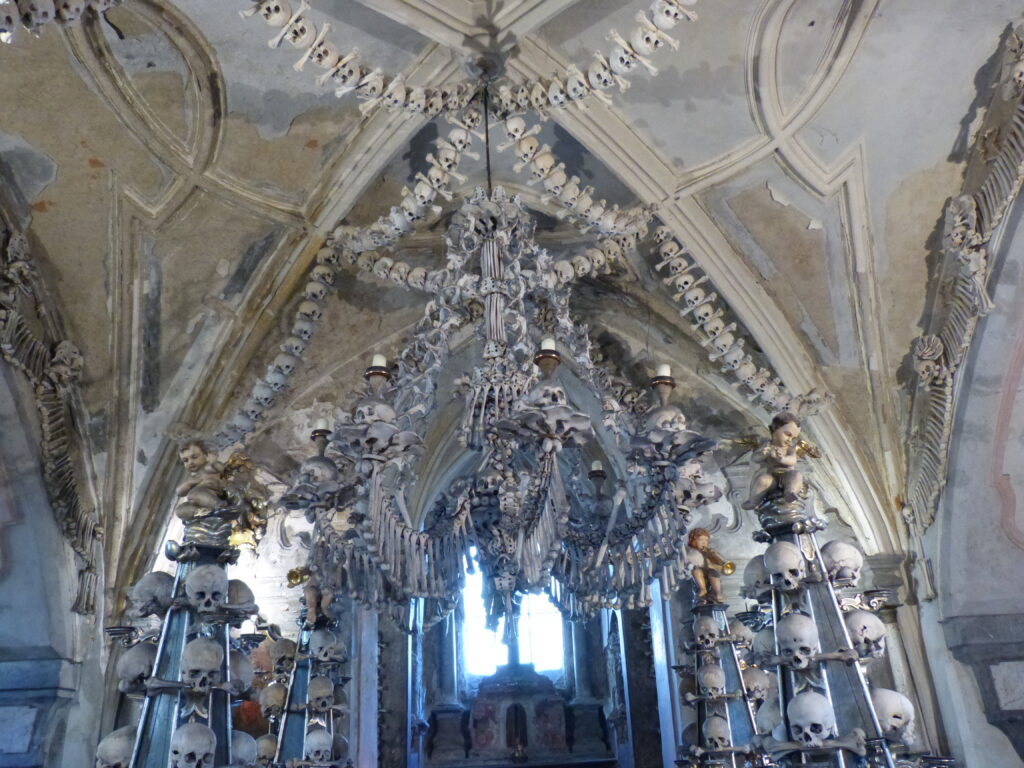
The ossuary, located under the Cemetery Church of All Saints, contains the artistically-arranged bones of over 50,000 people.
The chandelier you see there contains every bone in the human body.
Opinions of the ossuary range from fascinating to creepy to boring to overrated and everything in between.
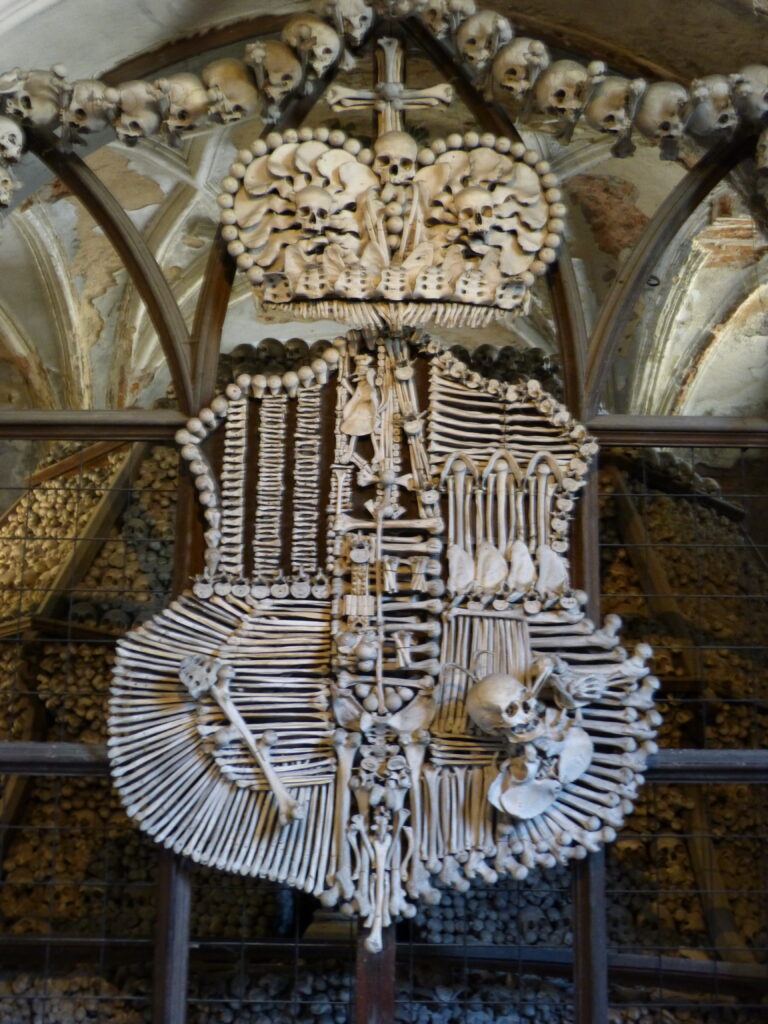
I personally thought it was worth a visit and didn’t find it creepy or overrated.
I actually found it kind of peaceful.
Contrary to both popular belief and the Wikipedia article on the ossuary, neither it nor the church it’s housed in are UNESCO World Heritage Sites.
There are, however, two churches in the area that are UNESCO sites
The first is the Cathedral of the Assumption of Our Lady and St. John the Baptist, which is pretty much down the street from the ossuary.
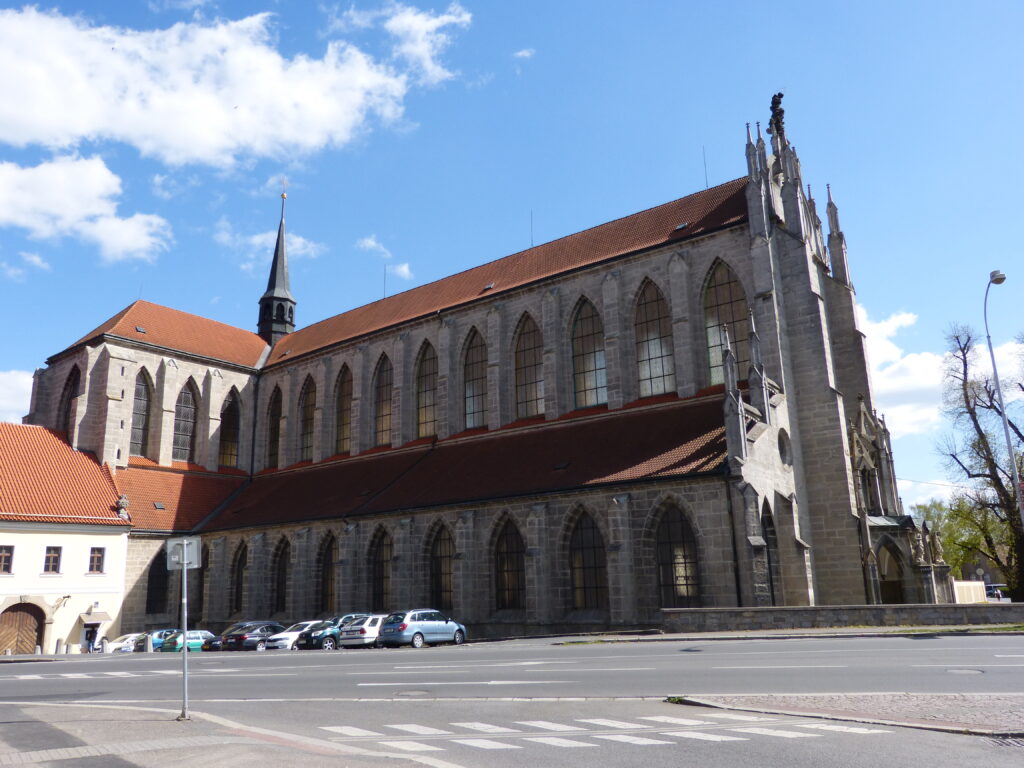
The original monastery was burned down during an attack in 1421 and several monks died as a result.
It was rebuilt in the early 1700s but later abandoned in 1783.
Between that time and when it reopened as a church in 1806, the building was used first as a flour warehouse and then a tobacco factory.
There are over 100 clear windows in the church and the interior is painted a light yellow, giving it a very open and airy feel.
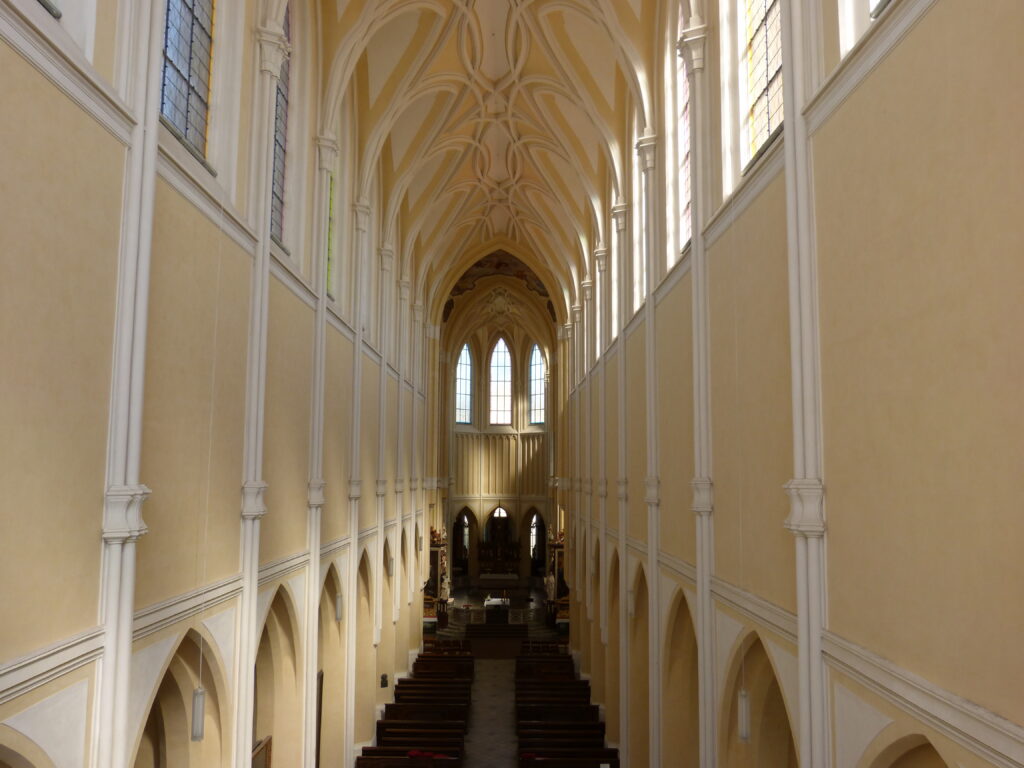
That photo was taken from the choir, which has fabulous views of the cathedral.
We spent about an hour inside looking at the paintings, relics, altars, chapels and sculptures and then drove over to the second church in town that’s a UNESCO site.
The second church in the area that’s a UNESCO site is the Church of St. Barbara, which we drove to from the cathedral.
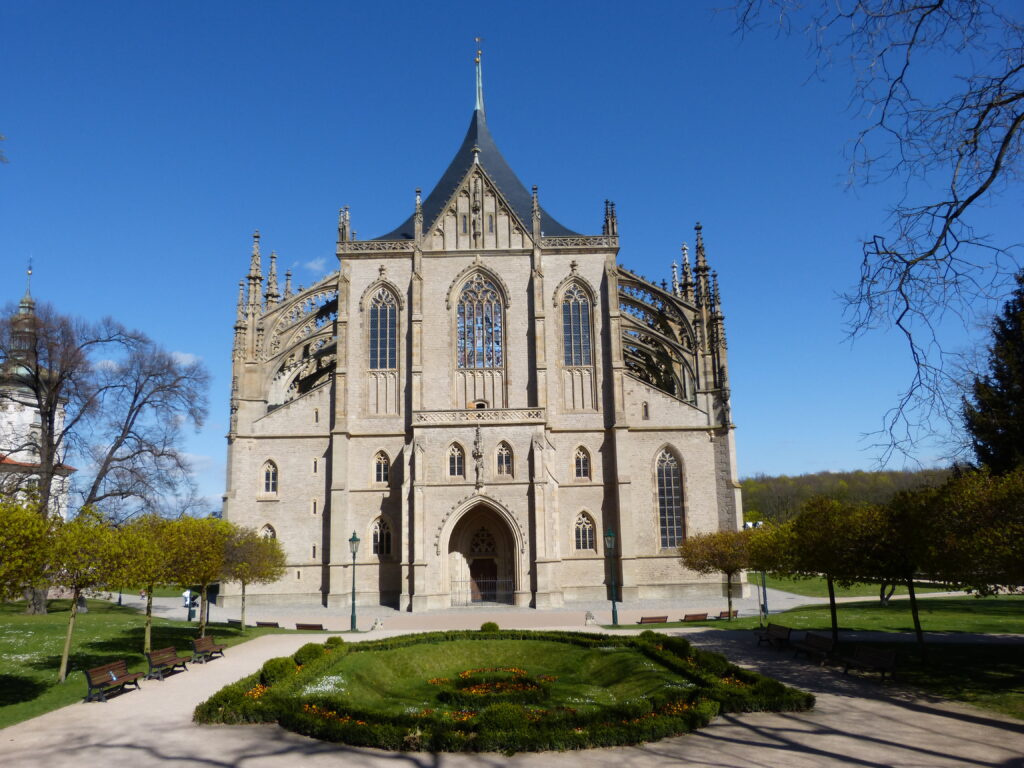
Construction on this church was begun in 1388.
It took over 500 years to complete and was finally finished in 1905.
Everything in this church is simply amazing – the stained glass, the frescoes, the ceiling, the sculptures, the altars, the pulpit, the woodwork – everything.
The sheer height of the place has you constantly looking upwards in awe.
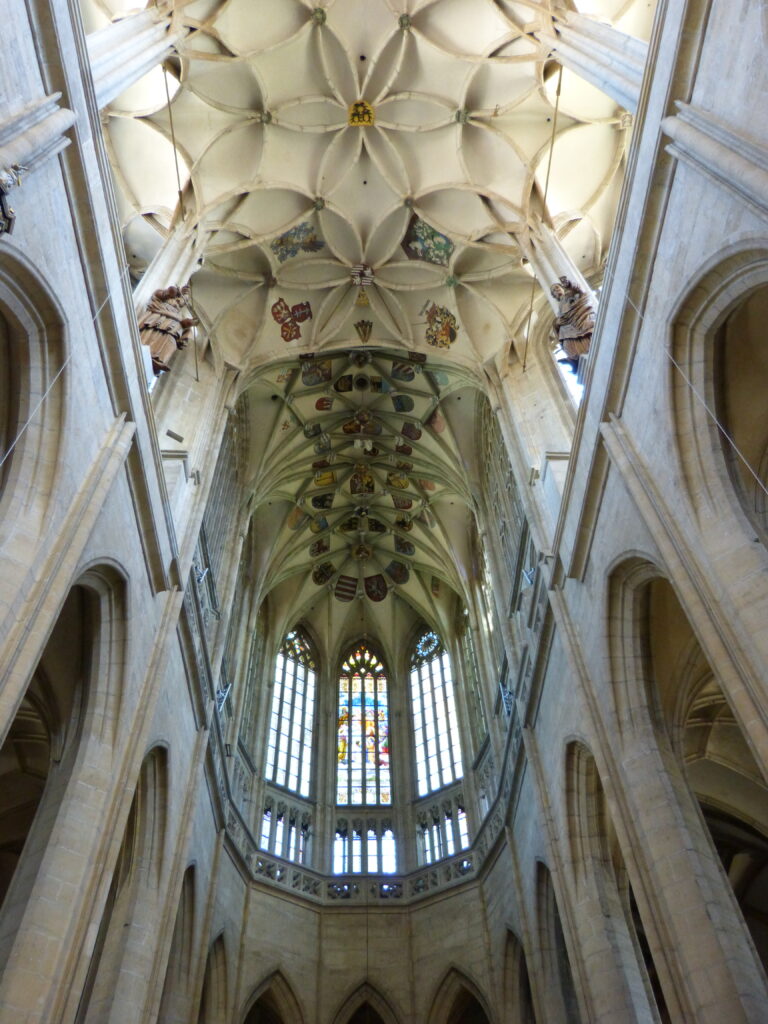
After getting our fill of the church, we walked around Kutná Hora for a bit.
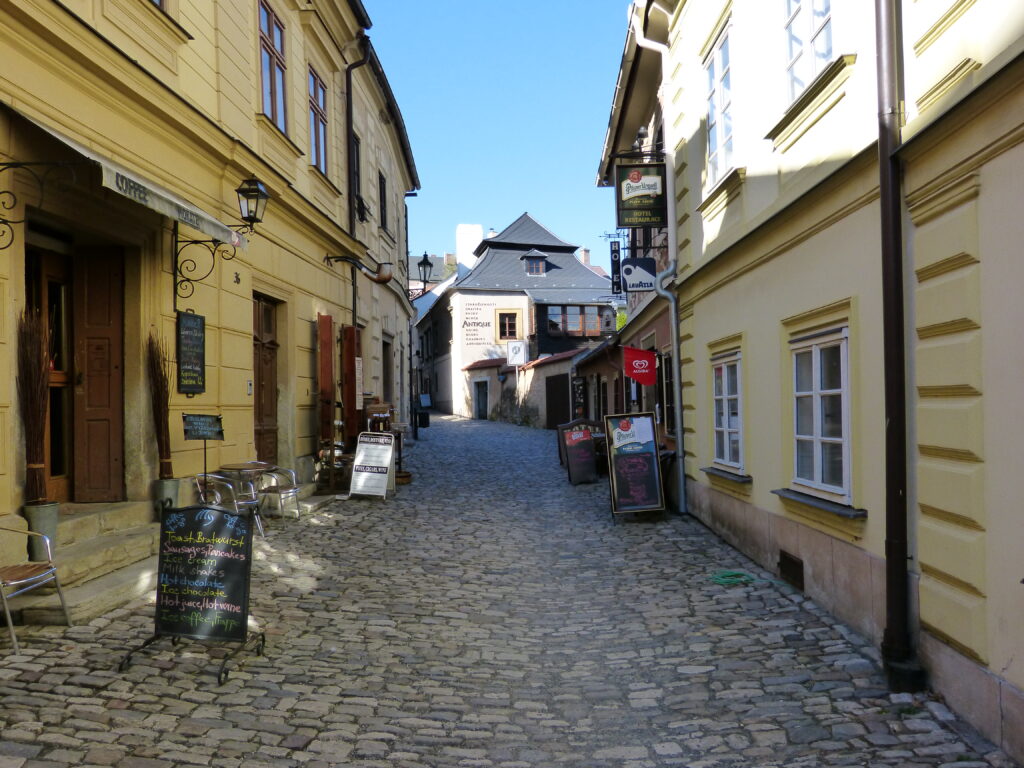
We didn’t have much time because we were heading to Prague and had to meet our Airbnb owner, but it’s a city I would like to explore more in depth.
There were two things I really wanted to see there, and the first was the Gothic Stone Fountain.
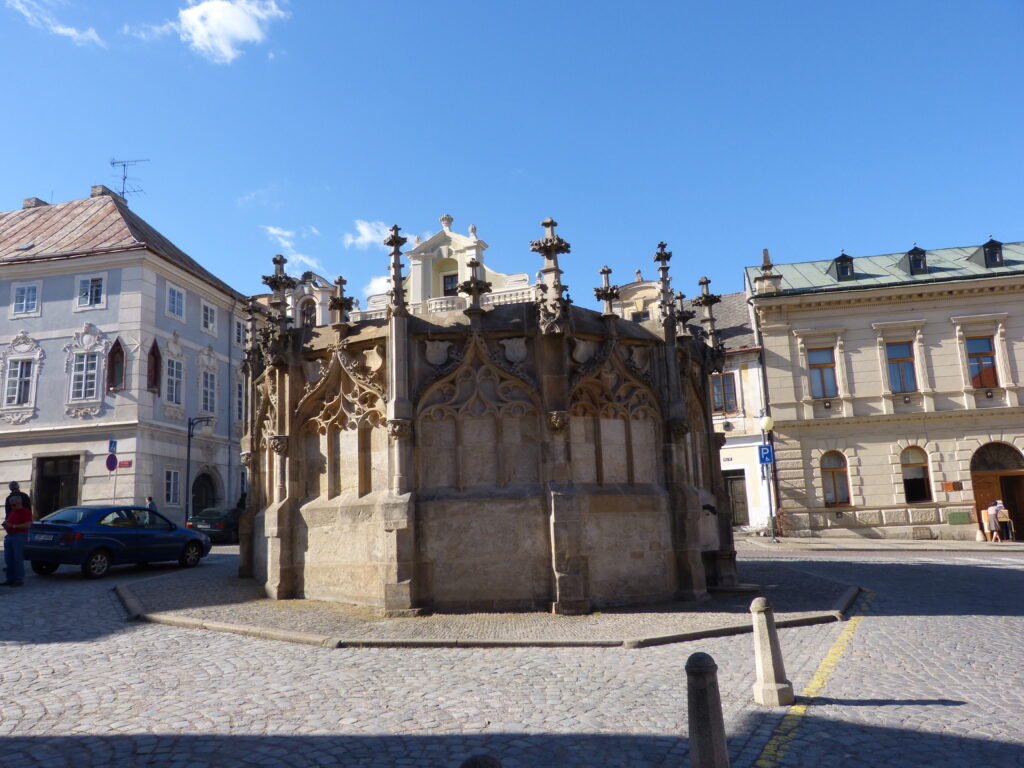
It was built in the 15th century and its architect also at one time worked on the Church of St. Barbara that you just read about.
The second thing I wanted to see was the Gothic Stone House.
Are you noticing a theme here?
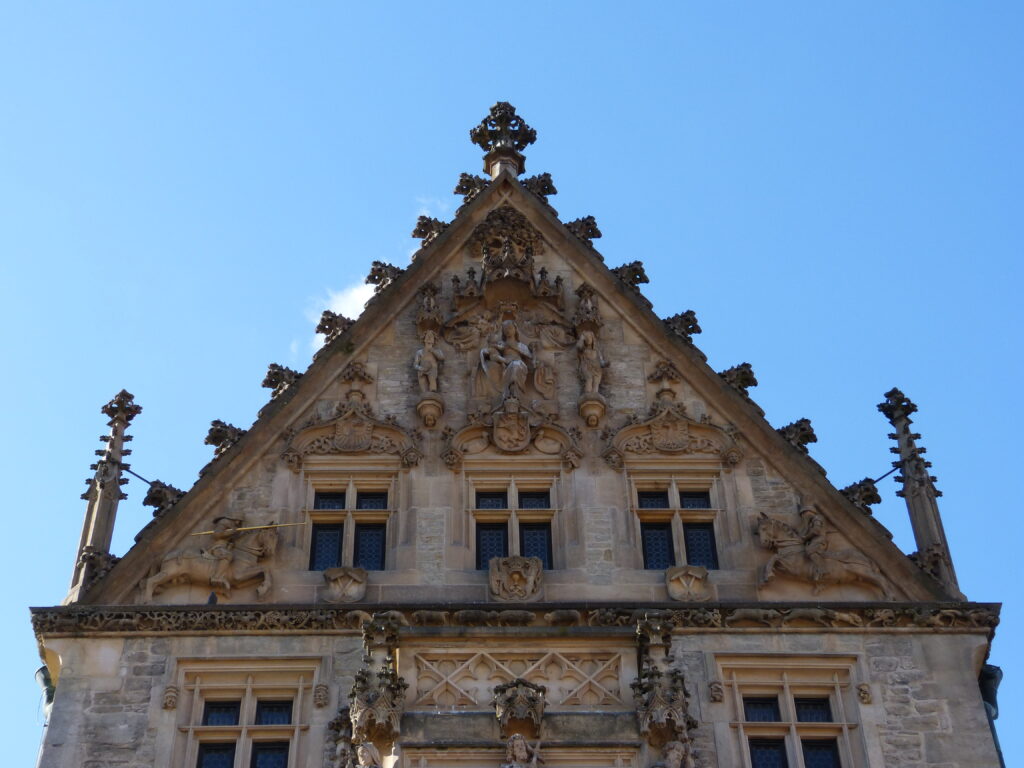
This was originally built in the 15th century by a wealthy merchant and is now a museum belonging to the city.
Having seen the two things I’d wanted to see, we left Kutná Hora and drove to Prague.
We found our Airbnb and parked the car, but the owner was nowhere in sight.
Turns out it was going to take him about 90 minutes to get to us, so we walked over to the river and had, of course, a TIPPLE.
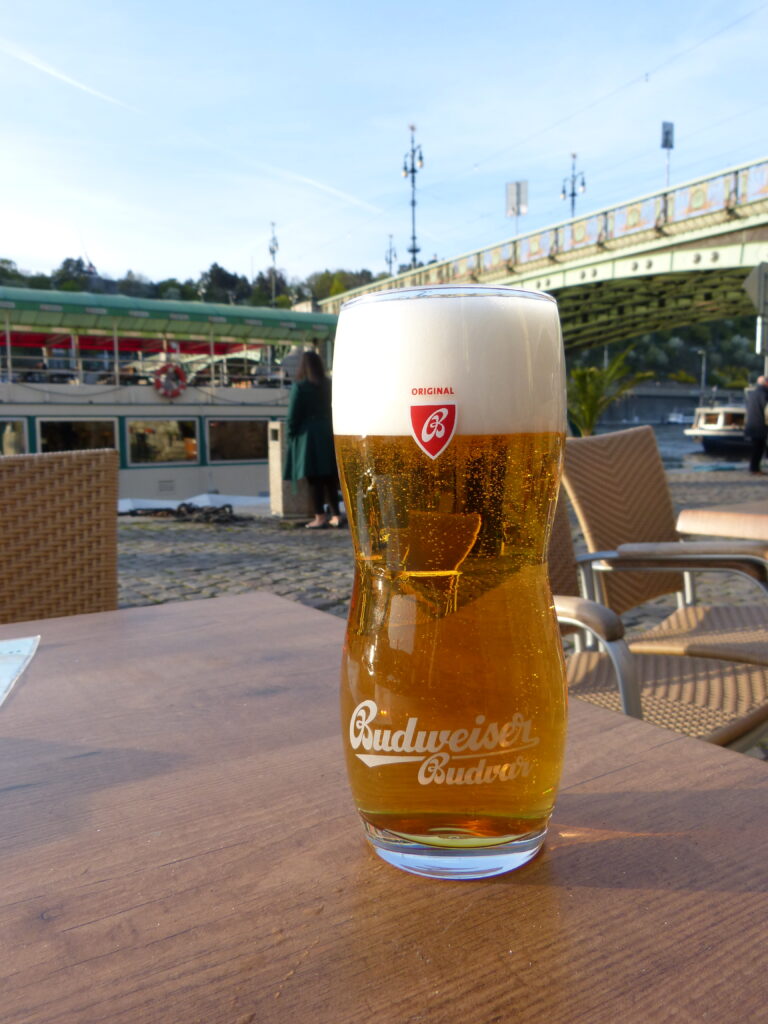
No, it’s not an American Budweiser beer.
It’s a Czech Budvar beer and it’s pretty darn good.
To backtrack a bit, when we were in Ostrava I suddenly remember that my friend’s son was living in Prague.
I contacted her and she gave me his mobile number and said she’d let him know we’d be in town.
When we arrived in Prague, I texted him and gave him the address of our Airbnb.
By an extraordinary coincidence, he was living in an apartment right next door to that.
I mean really, what are the odds?
100%, apparently.
Anyway, we finally met up with the Airbnb owner who was horrified that we’d left our car parked on the street while waiting for him.
Apparently street parking is by permit only and they do not hesitate to tow your car away if you park illegally.
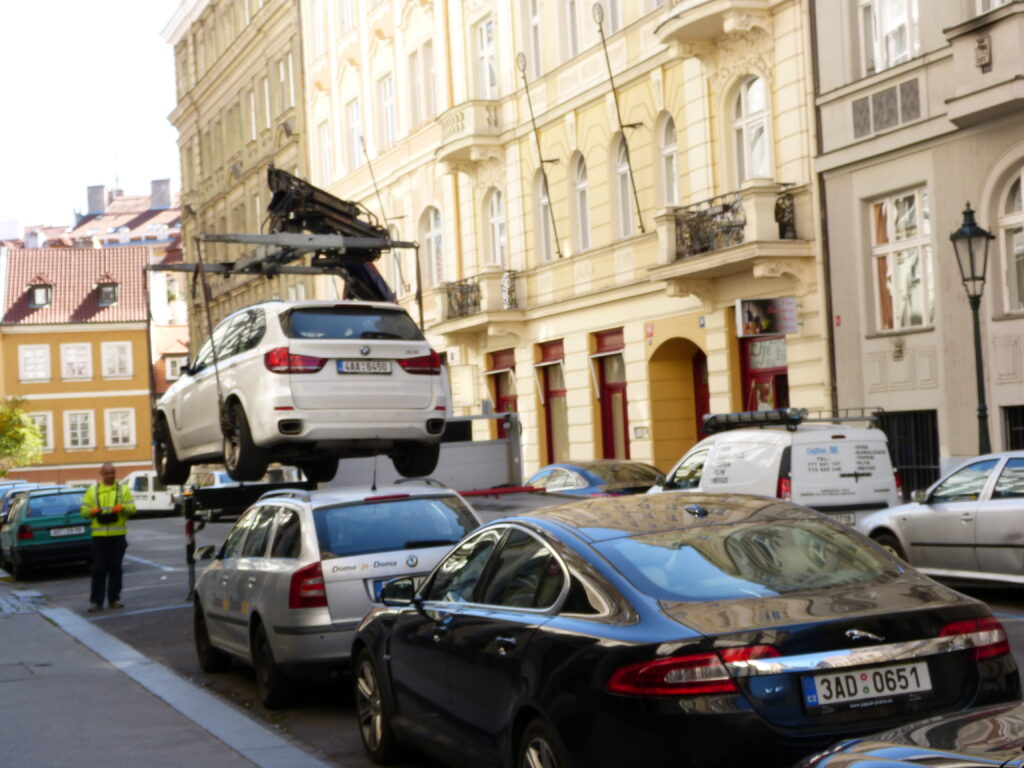
When we left the apartment the next morning to walk around Prague, we saw a good three or four cars being towed like this.
We considered ourselves lucky that we were able to get our car to a parking lot before that happened to us.
Sadly we had only one full day in Prague but happily we had fabulous weather.
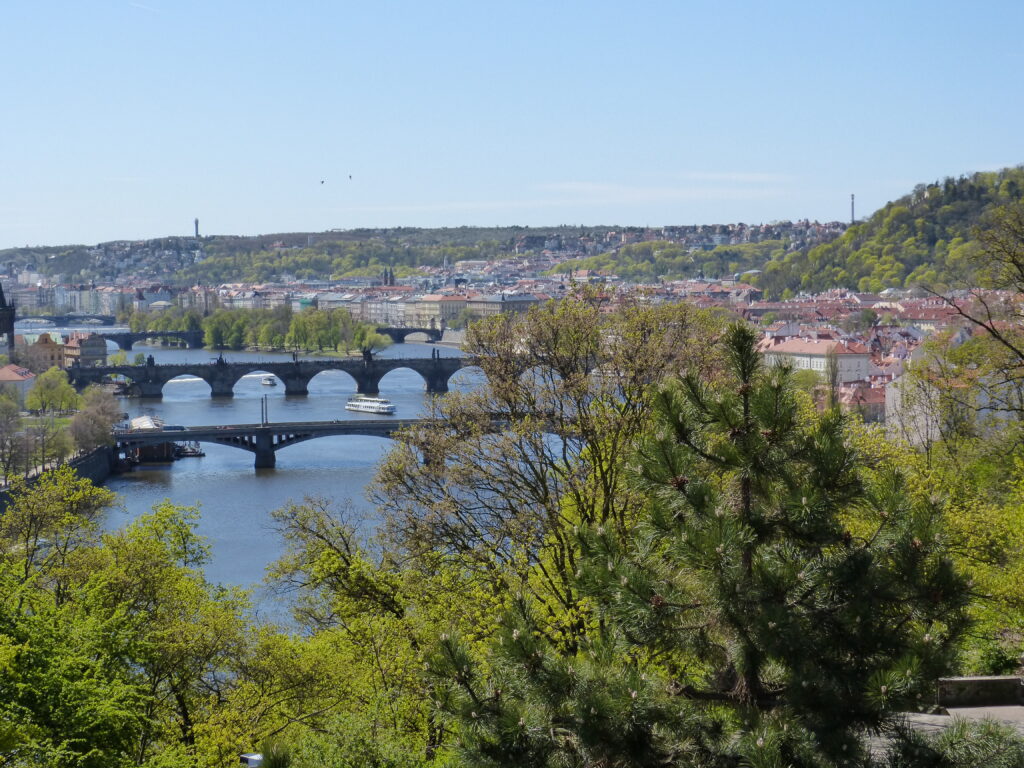
Acting on the advice of BBQ and Spanky (https://bbqboy.net/), we walked through Letná Park to the Prague Castle.
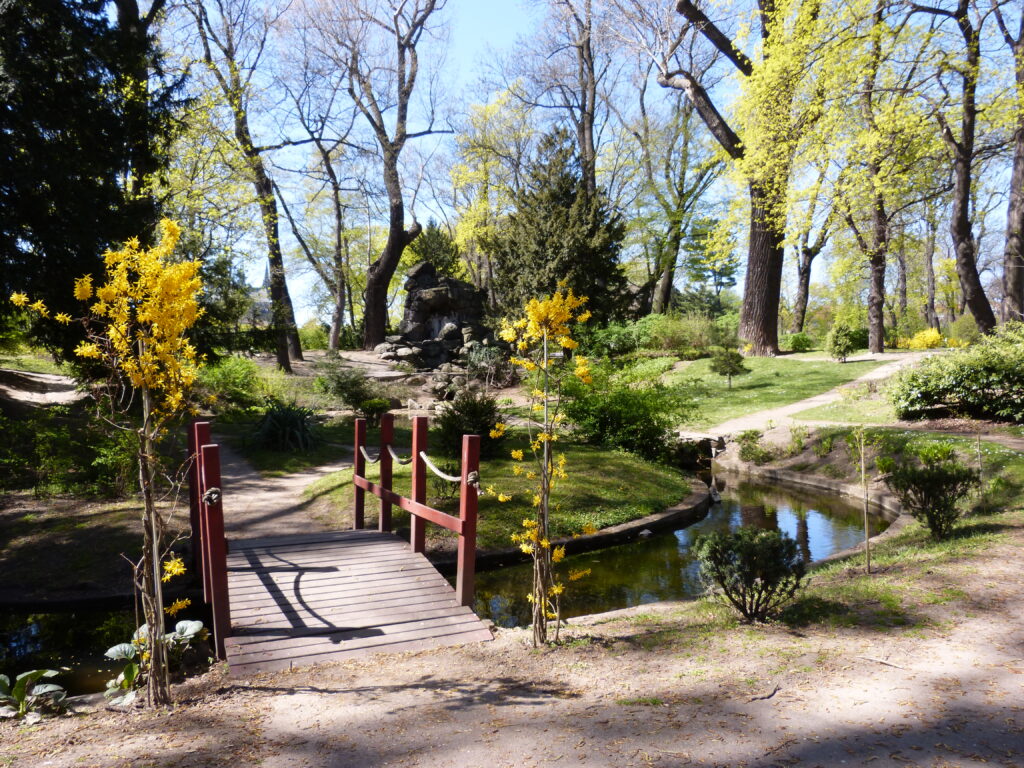
Would you ever guess from looking at that photo that it was taken in the middle of Prague?
Letná Park is beautiful and peaceful and I highly recommend walking through it if you are visiting the castle complex.
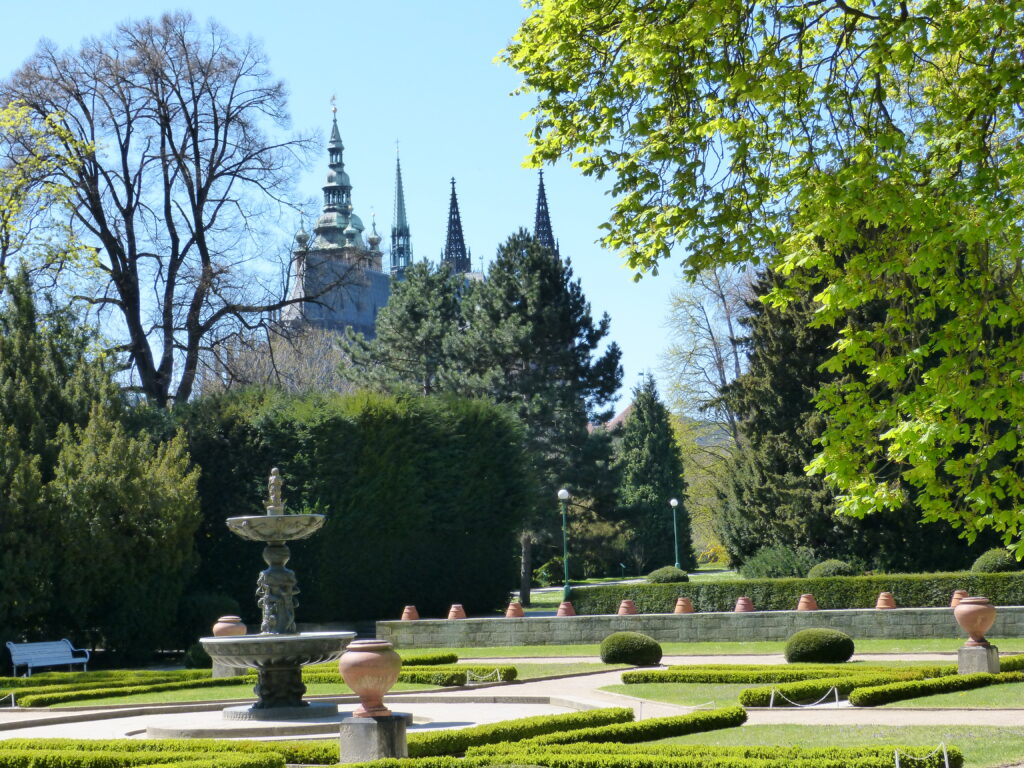
We ended up spending most of the day walking the park and visiting the castle complex.
Sitting outside, we had a nice lunch at one of the restaurants at the complex.
We even got to see a little changing of the guard ceremony.
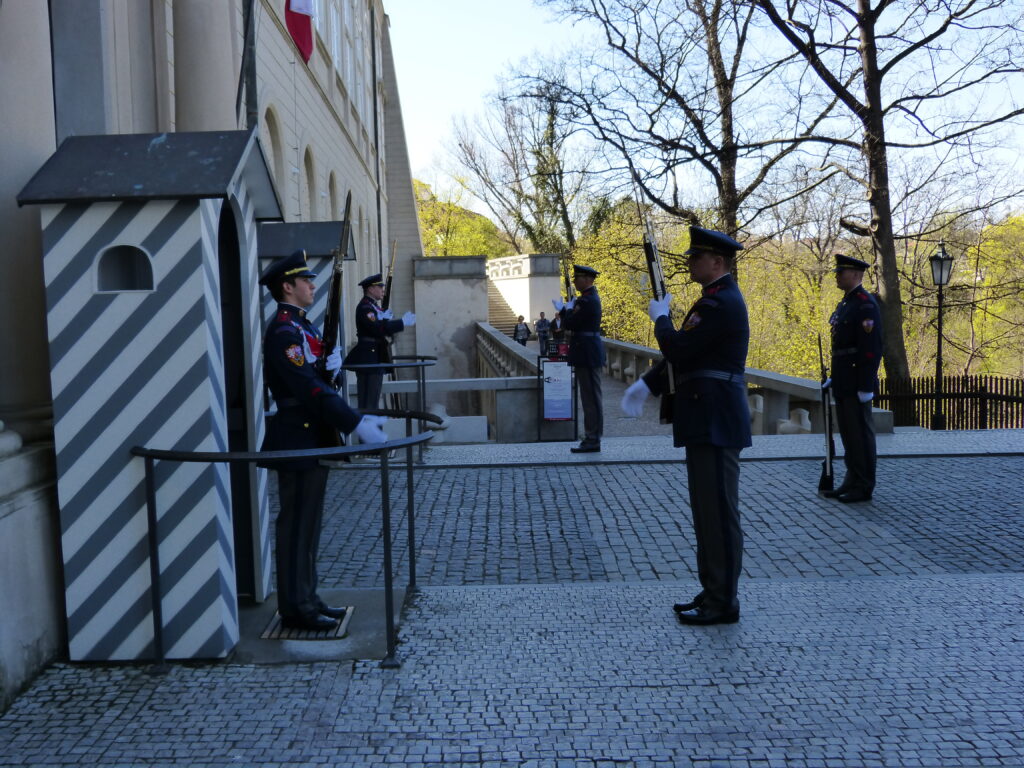
We bought a combination ticket that included entrance to the castle as well as a few other sites.
Although we didn’t go inside the castle, we did go to the other sites included on the combination ticket.
We started off at the St. Vitus Cathedral.
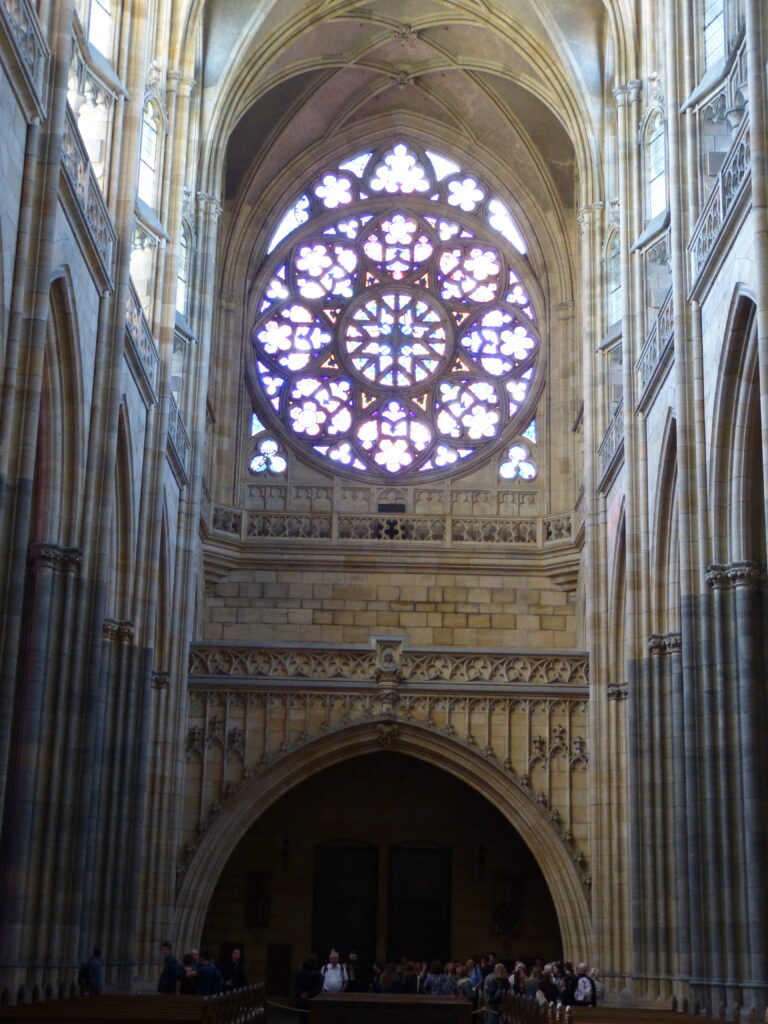
Although you can get inside the cathedral without a ticket, you can’t see much.
If you notice the people at the bottom of that photo, they’re just inside the main entrance and that’s as far as you can go without a ticket.
That stained glass rose window is one of the most impressive things in the cathedral, and without a ticket you can hardly even see it because it’s directly above your head.
If you’re going to make the trip all the way there, I suggest paying to see the cathedral even if you see nothing else at the complex.
After that we went to the Basilica of St. George, also included on the combination ticket.
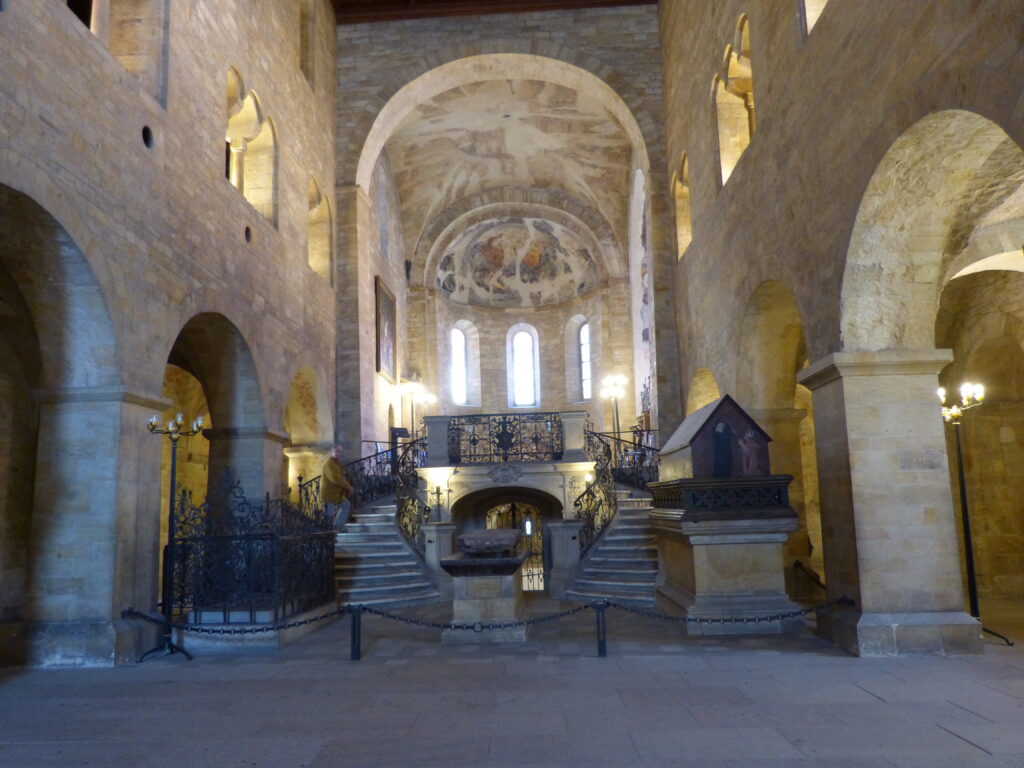
It’s fairly small compared to the St. Vitus cathedral, but still worth a visit.
The last stop before leaving the complex was the Golden Lane.
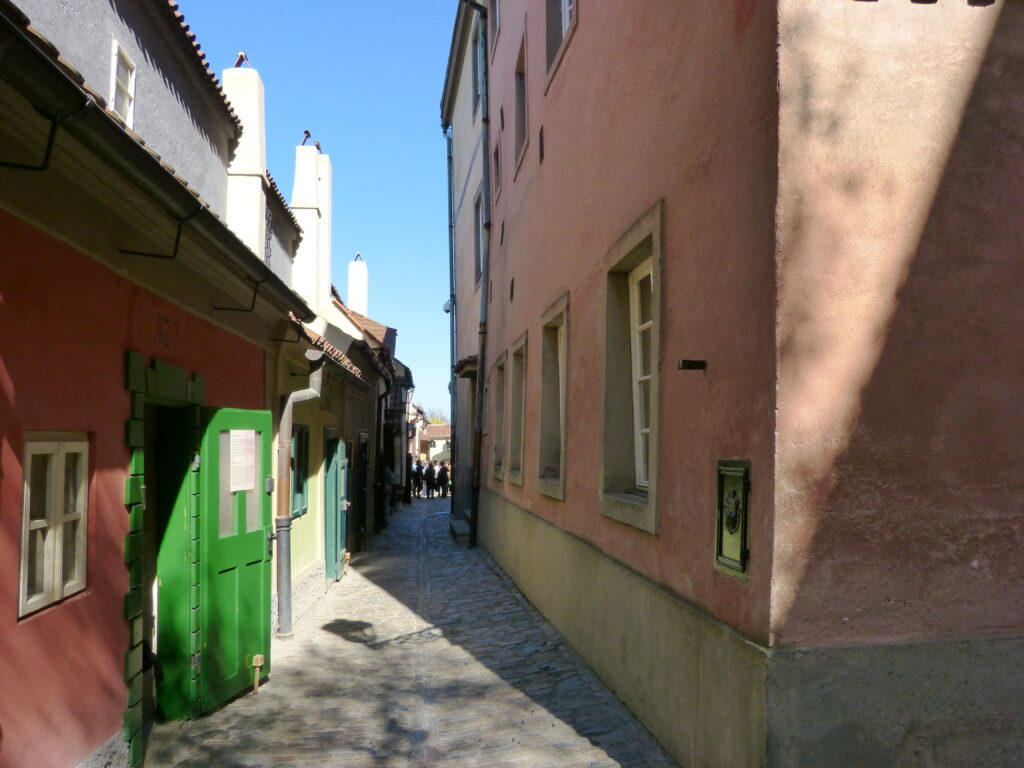
As you can see, it’s a narrow little lane with small, brightly-colored houses.
They were first used as residences and shops back in the 15th century.
The author Franz Kafka, who was born in Prague, lived and wrote in the Golden Lane for a couple of years.
To get back to the Old Town, we continued walking through the park and were treated to some fabulous views over the city.
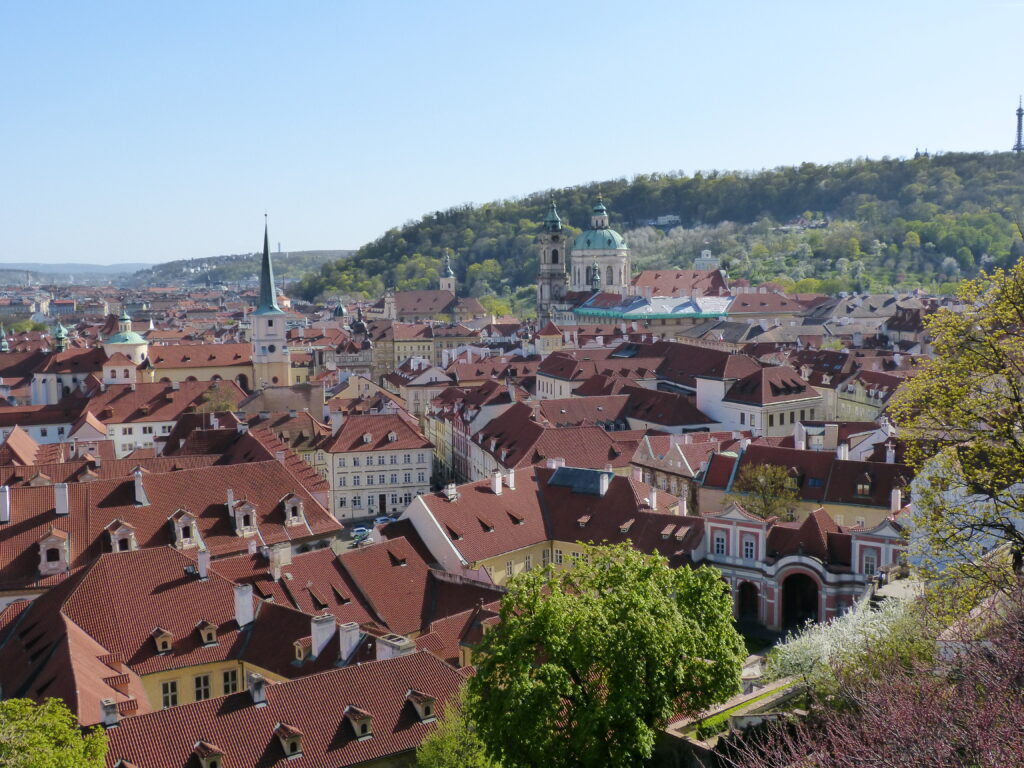
Because the castle is on a hill, you have to walk down a pretty steep street to get back to the Old Town.
Eventually we ended up crossing over the famous Charles Bridge.
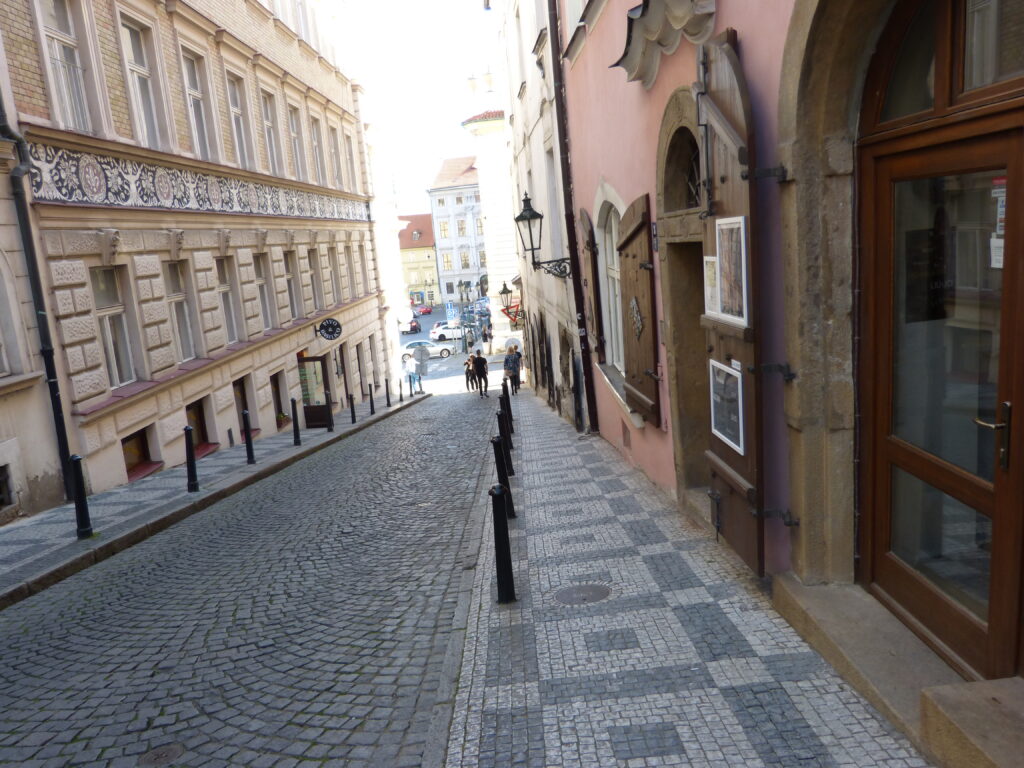
Most people post photos of the statues that line the bridge so I’m going to post a different photo.
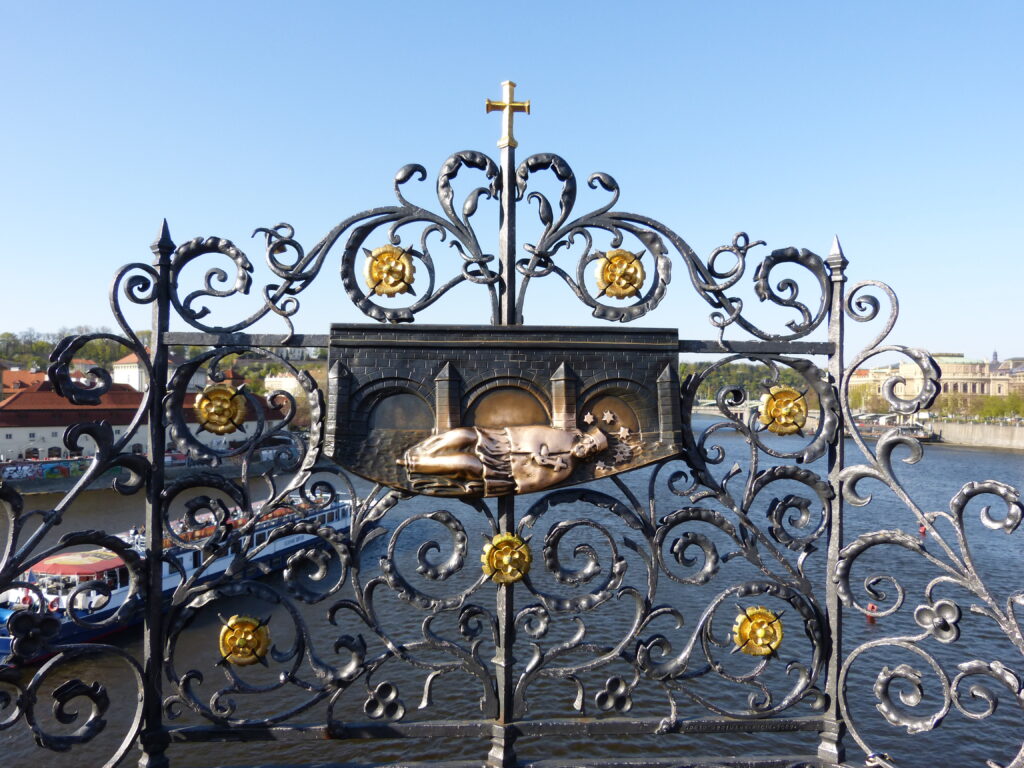
On that decorative piece of wrought iron is a depiction of St. John of Nepomuk with a cross at the top.
Rubbing the cross is supposed to bring you good luck, and people obviously rub the saint as well.
The cross marks the spot where St. John of Nepomuk was thrown off the bridge and drowned for defending the Catholic church.
After crossing the bridge into the Old Town, we had a few beers at a couple of places and then headed back to the apartment.
The next morning we took the train to the lot where we’d parked the car and then drove the 5 hours back home to Germany.
While we liked Prague, we absolutely fell in love with the Czech Republic outside of its capital.
In fact we made another trip there last year, so look for an upcoming post on that as well.

